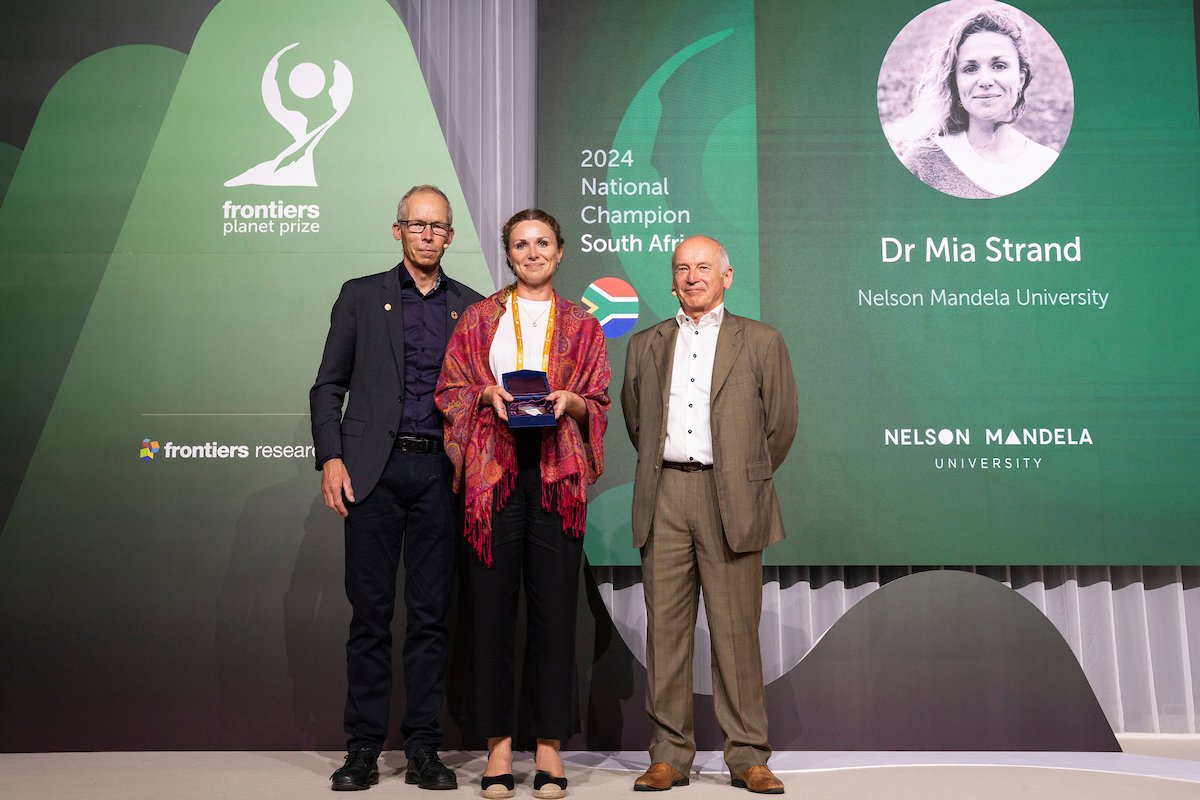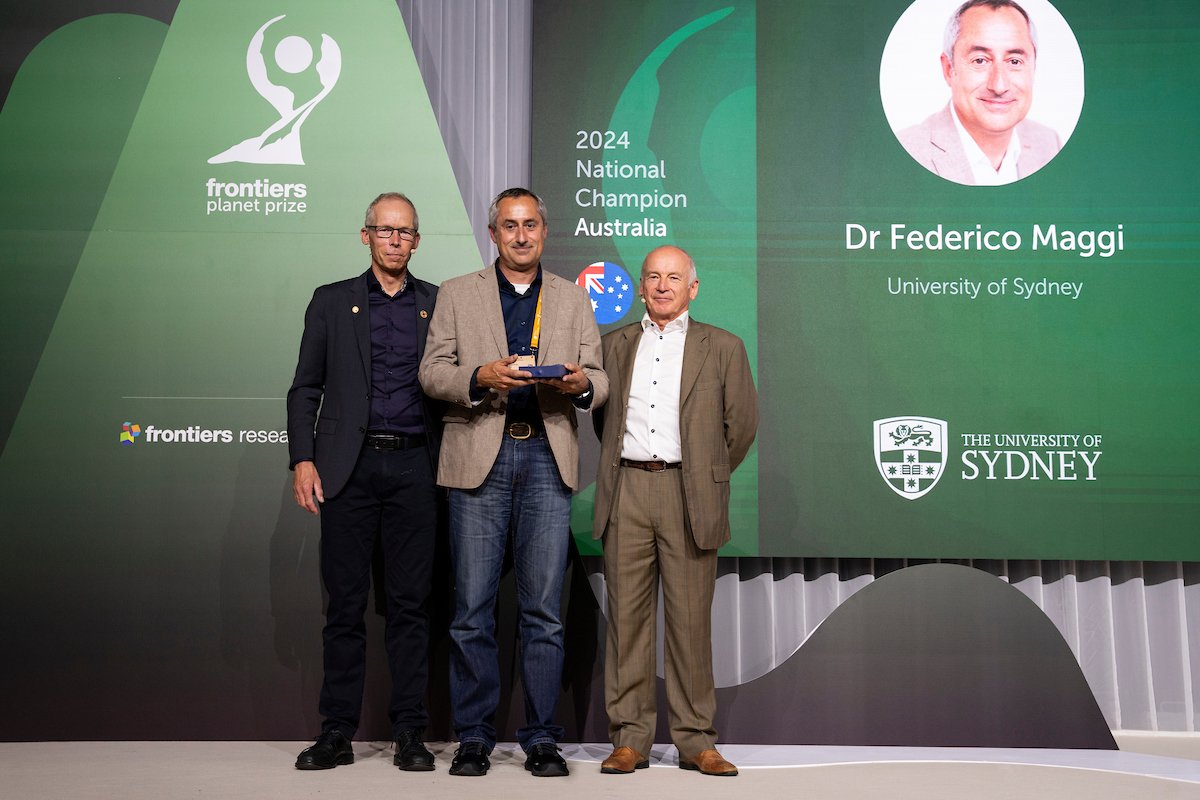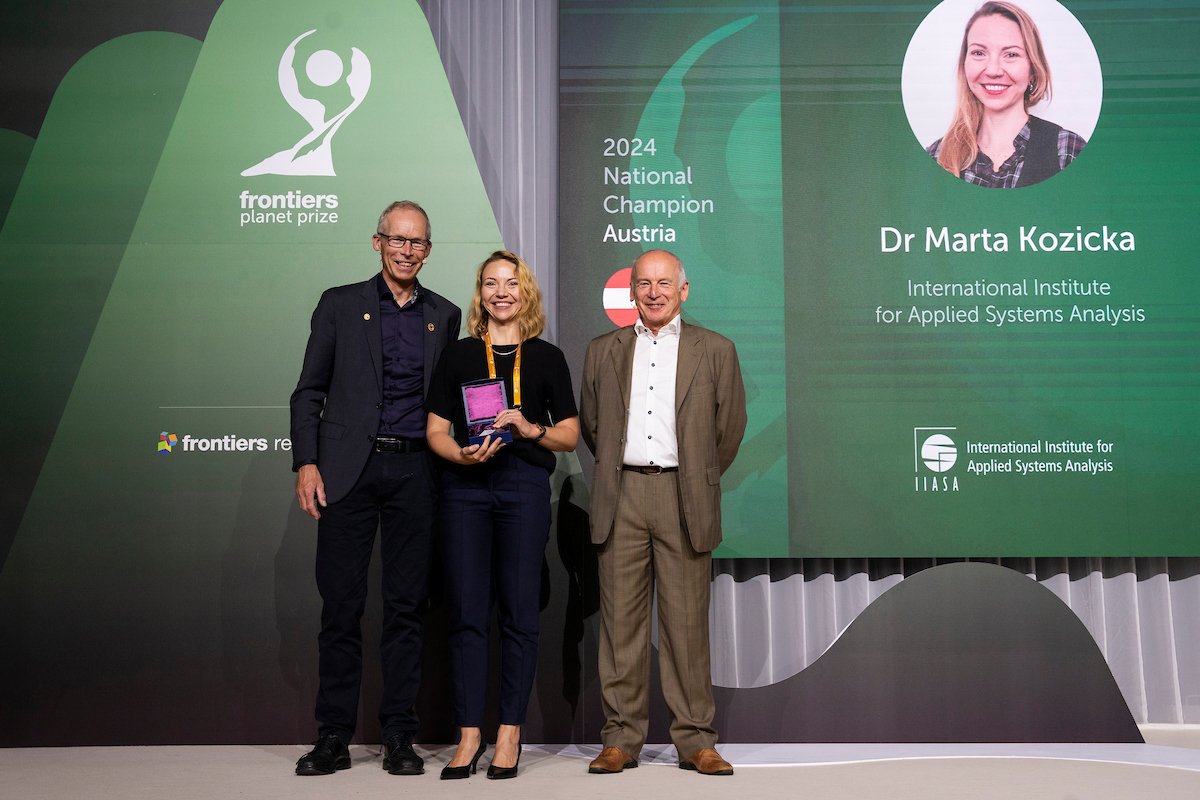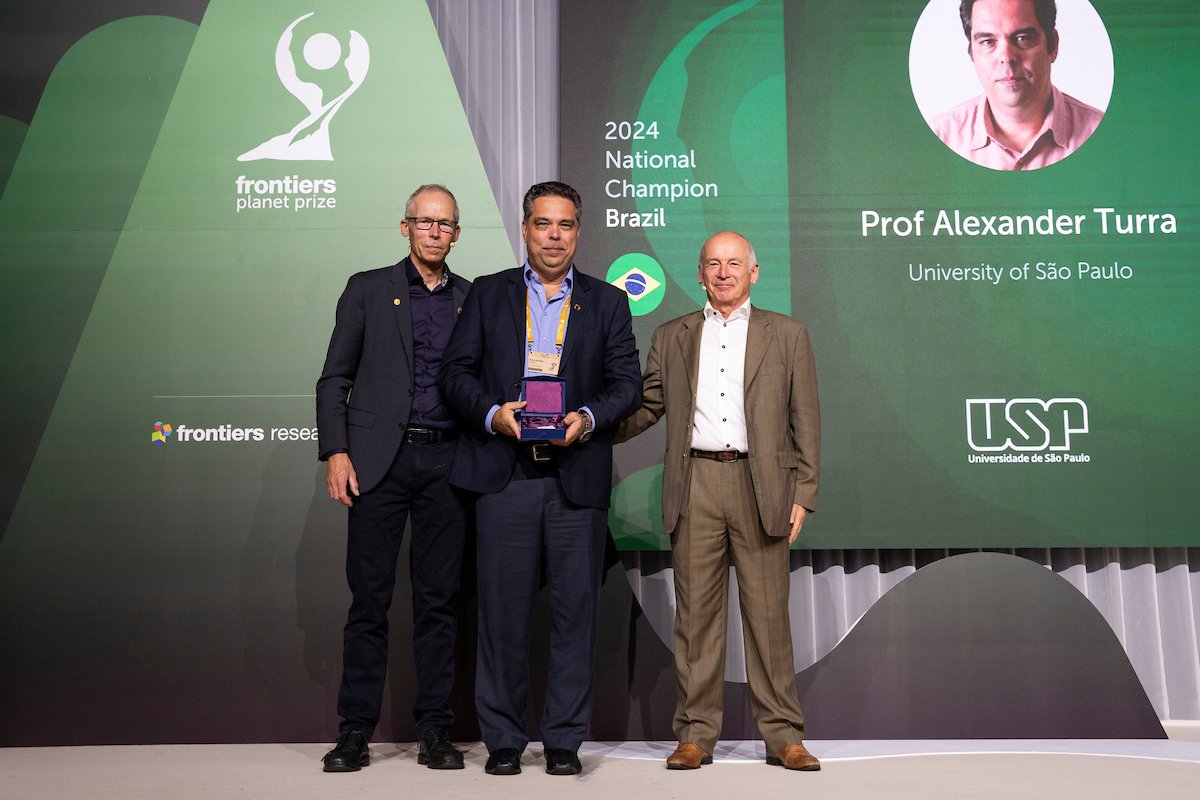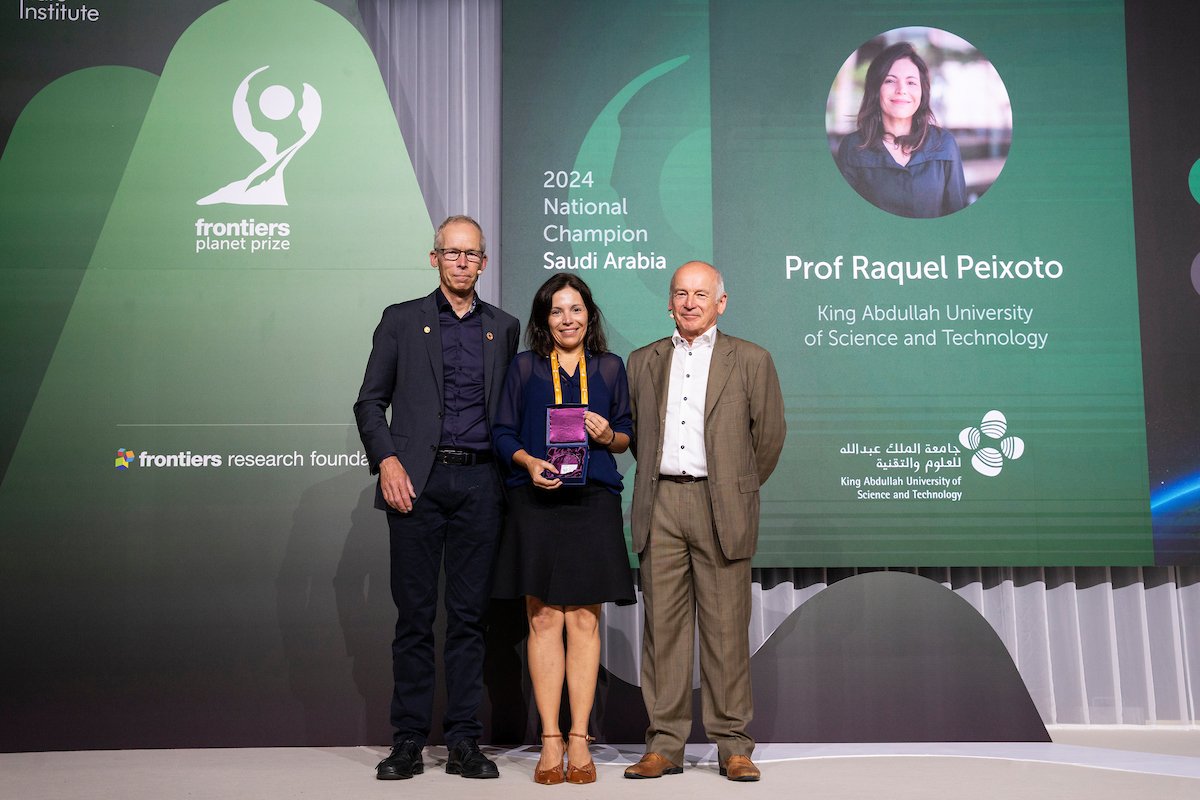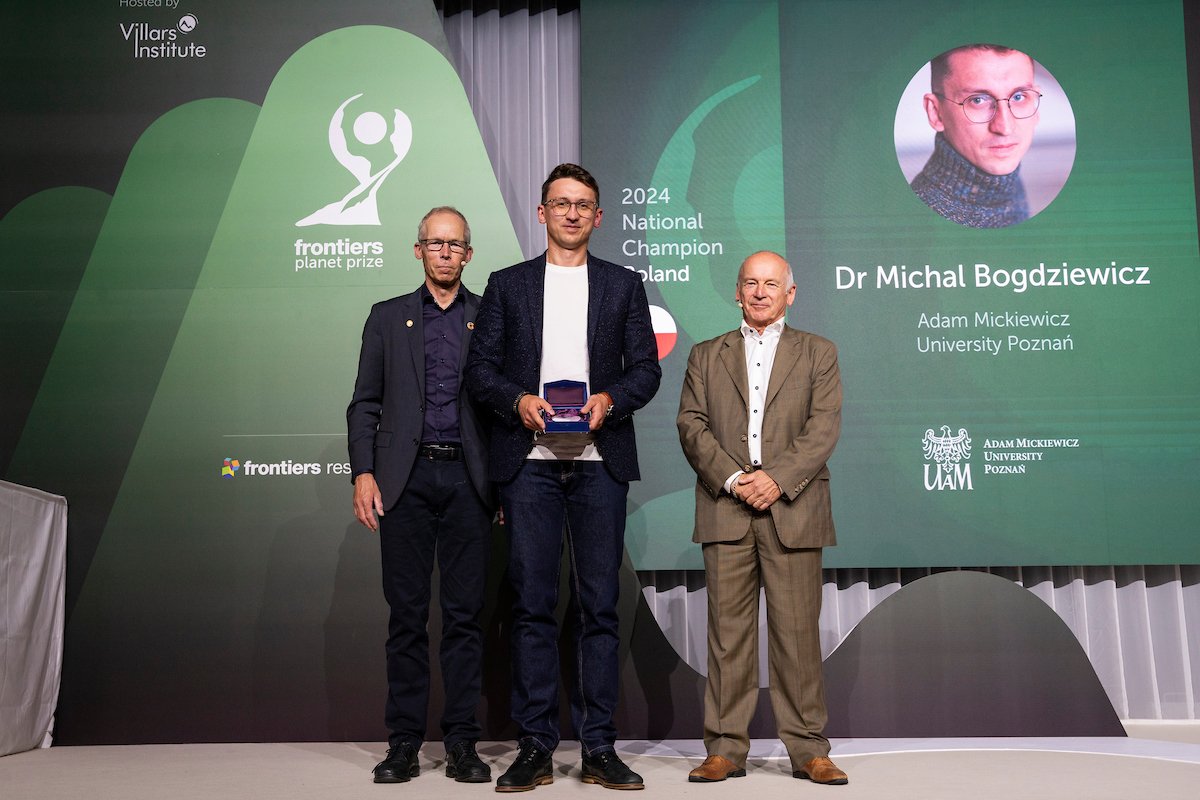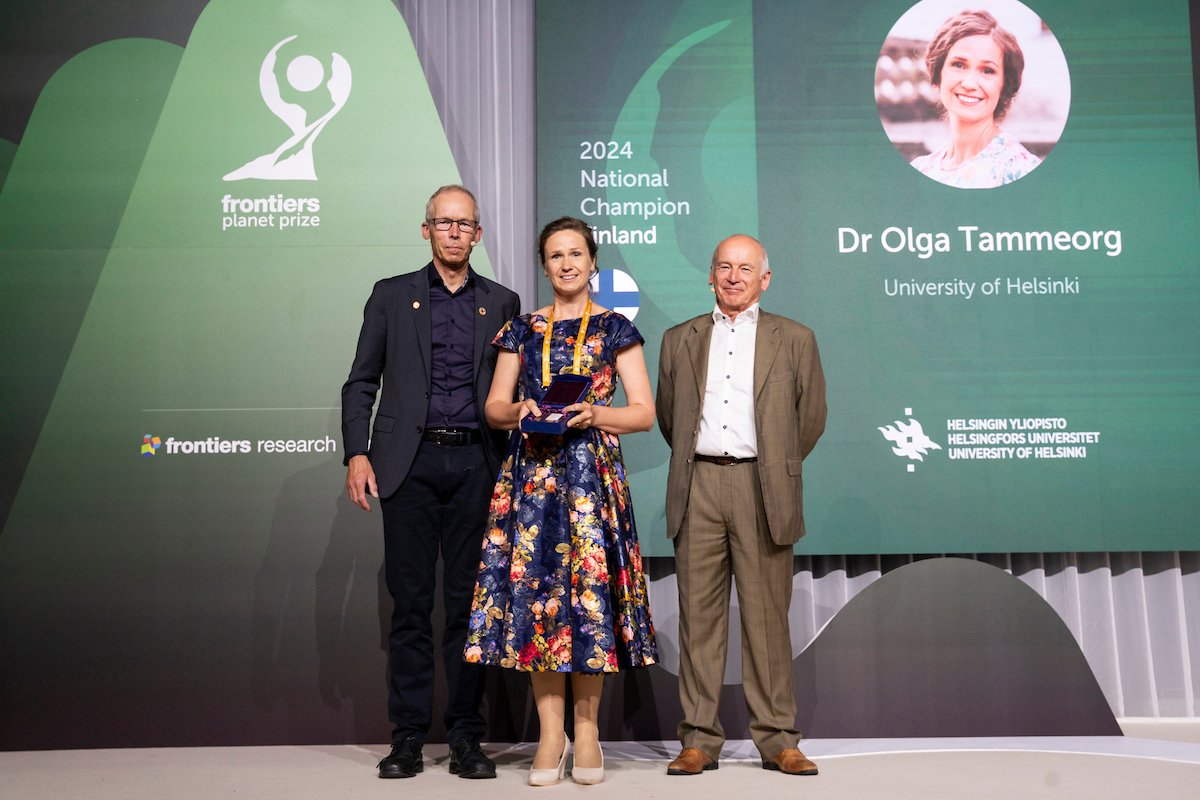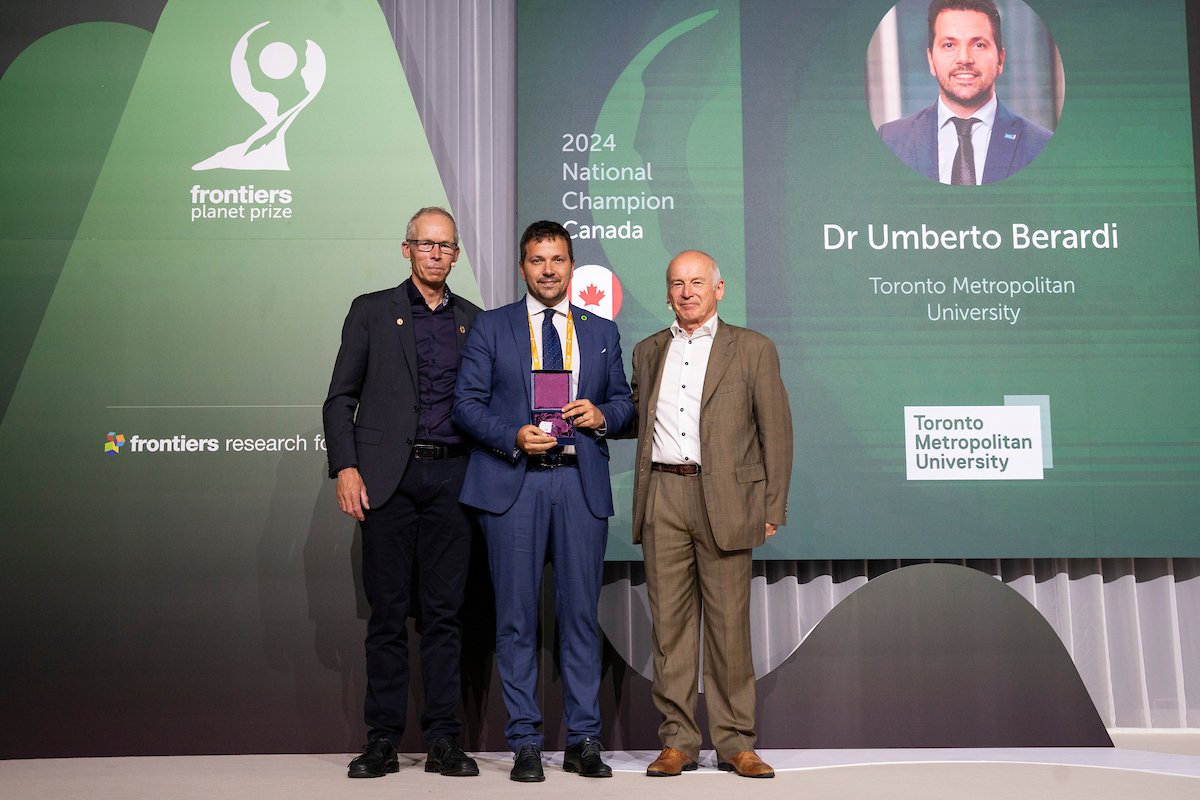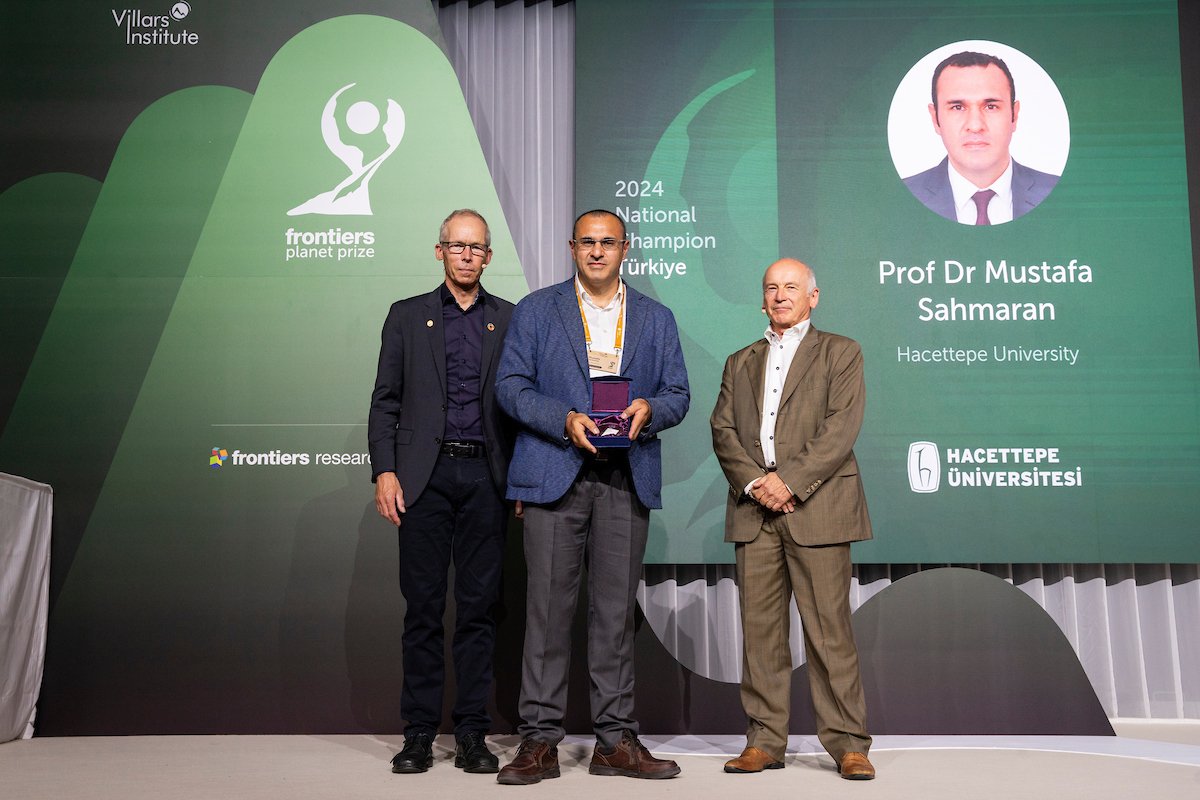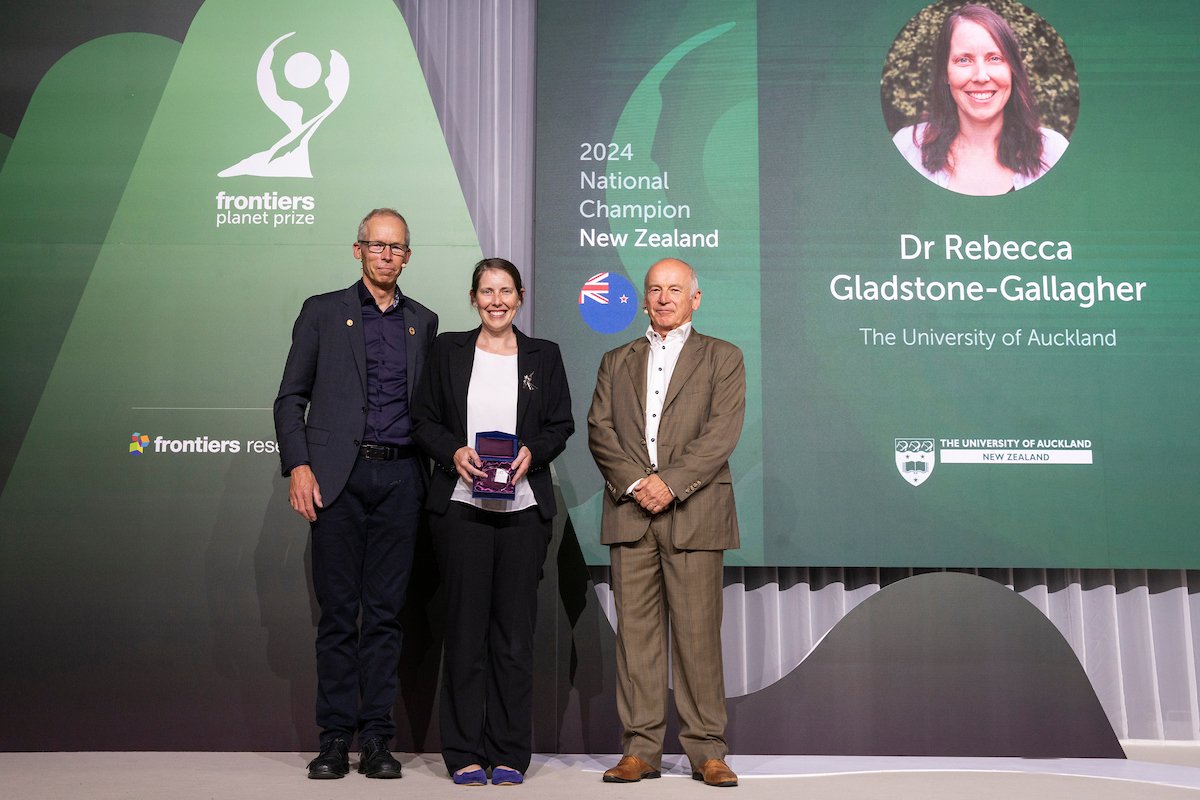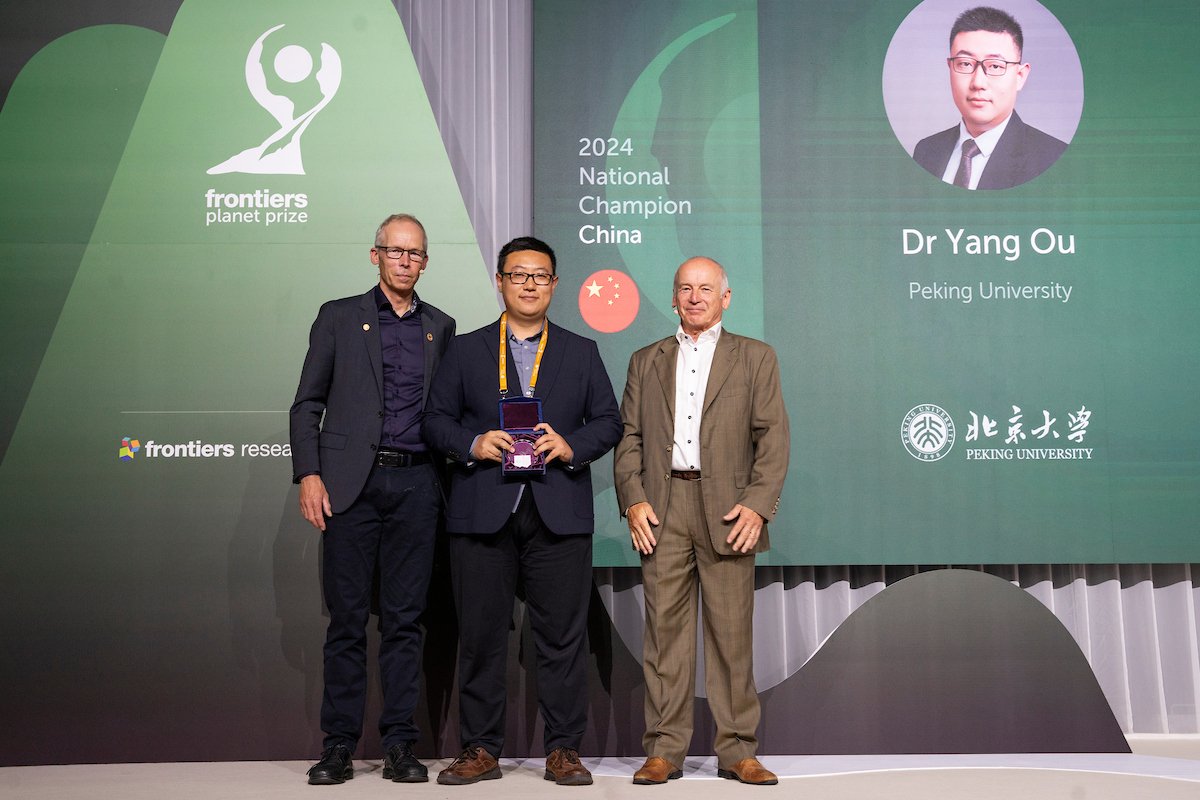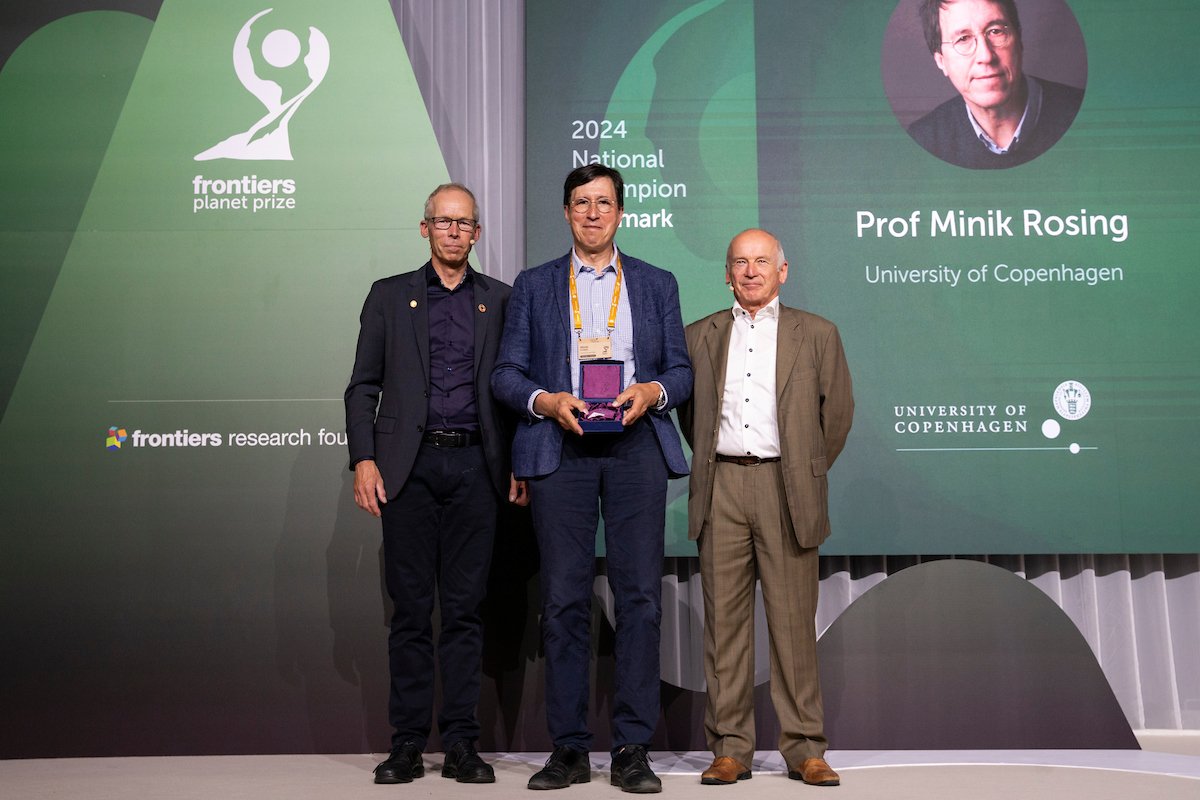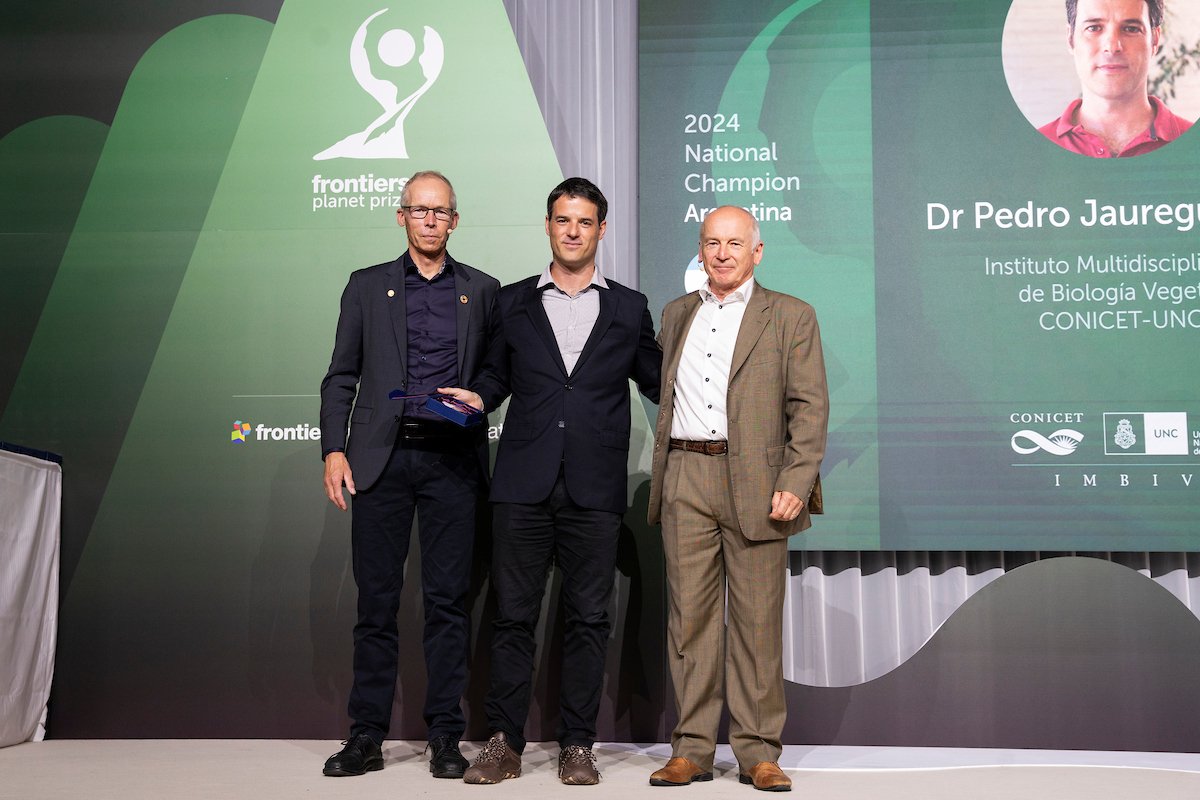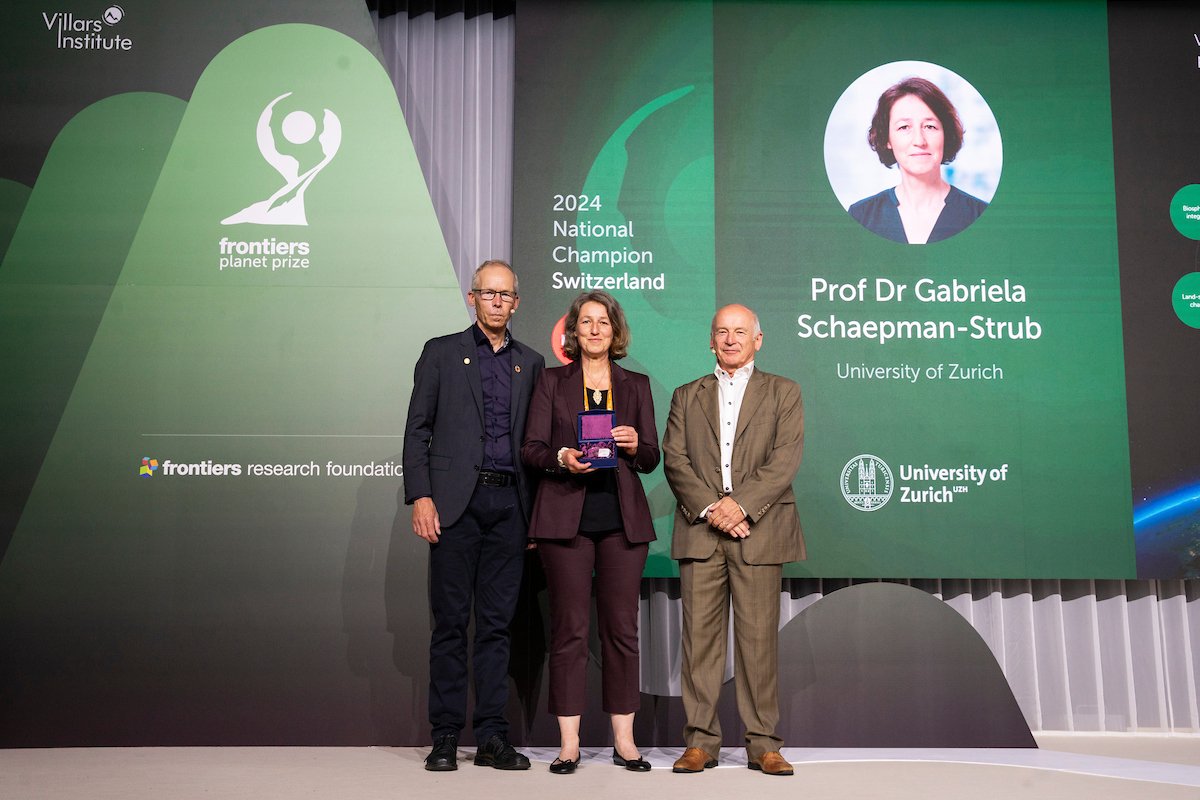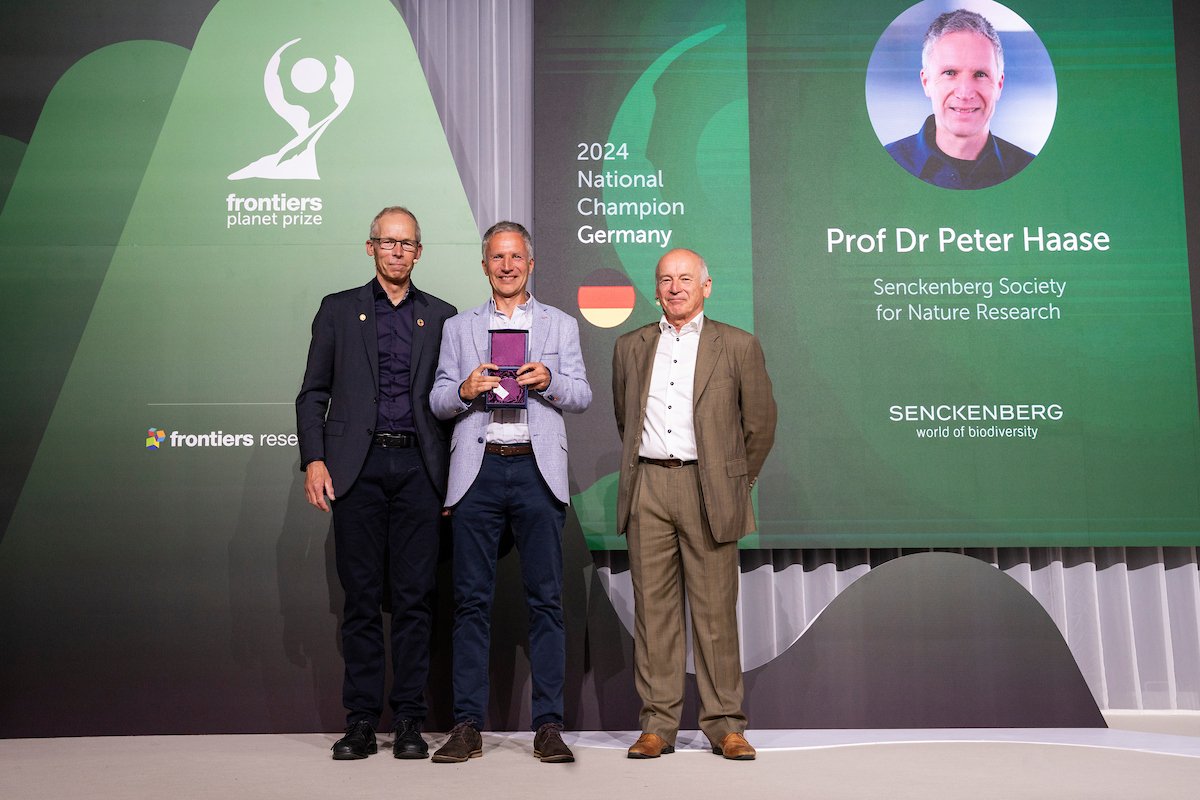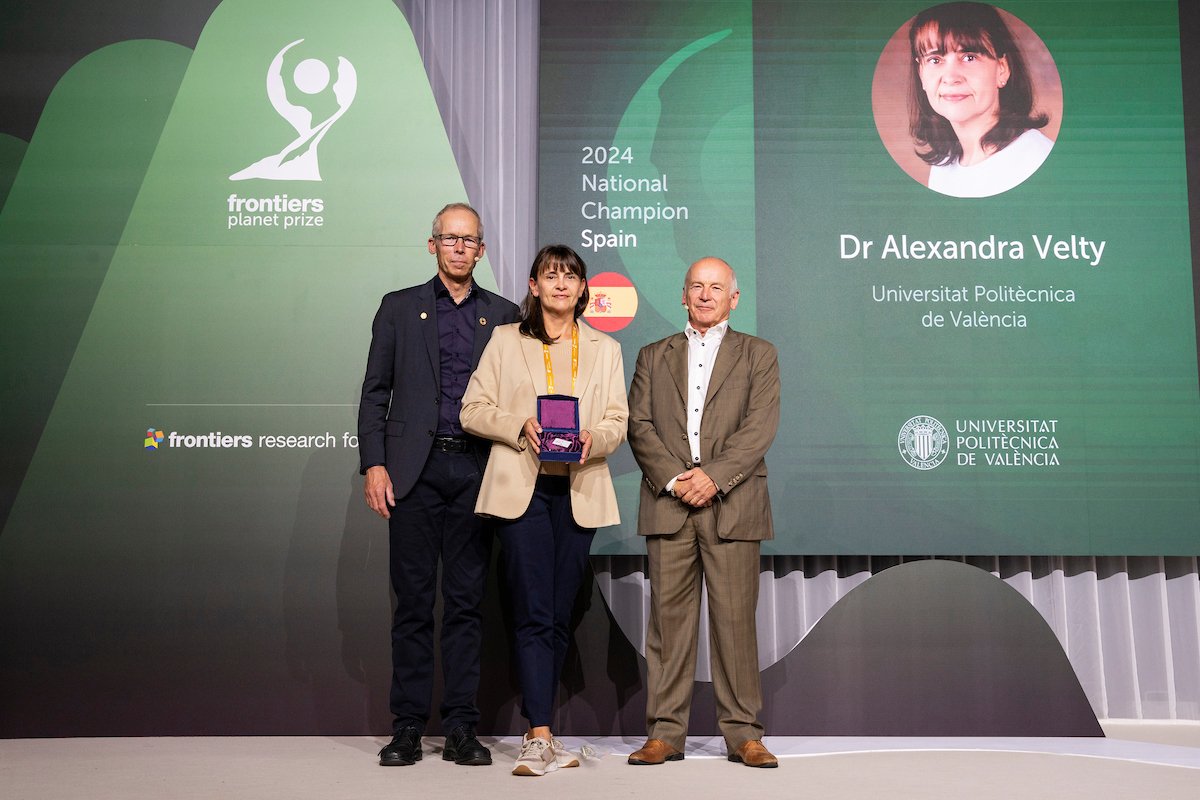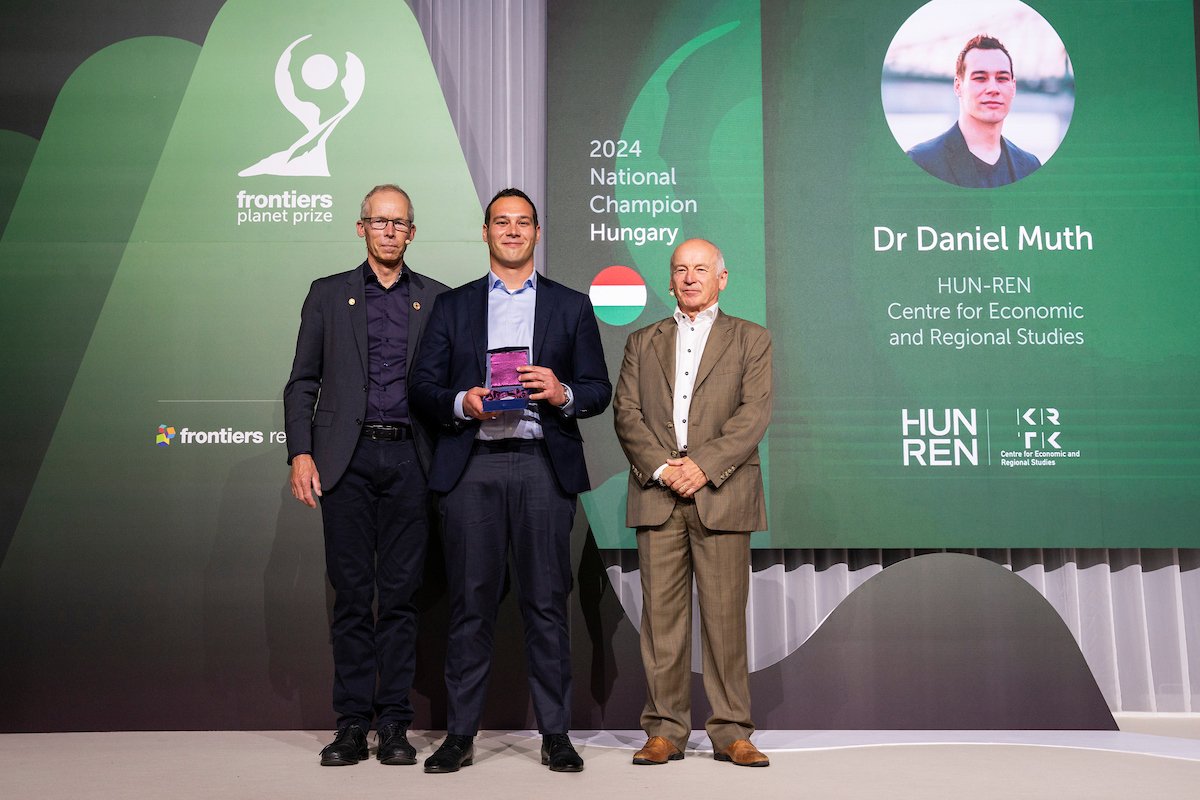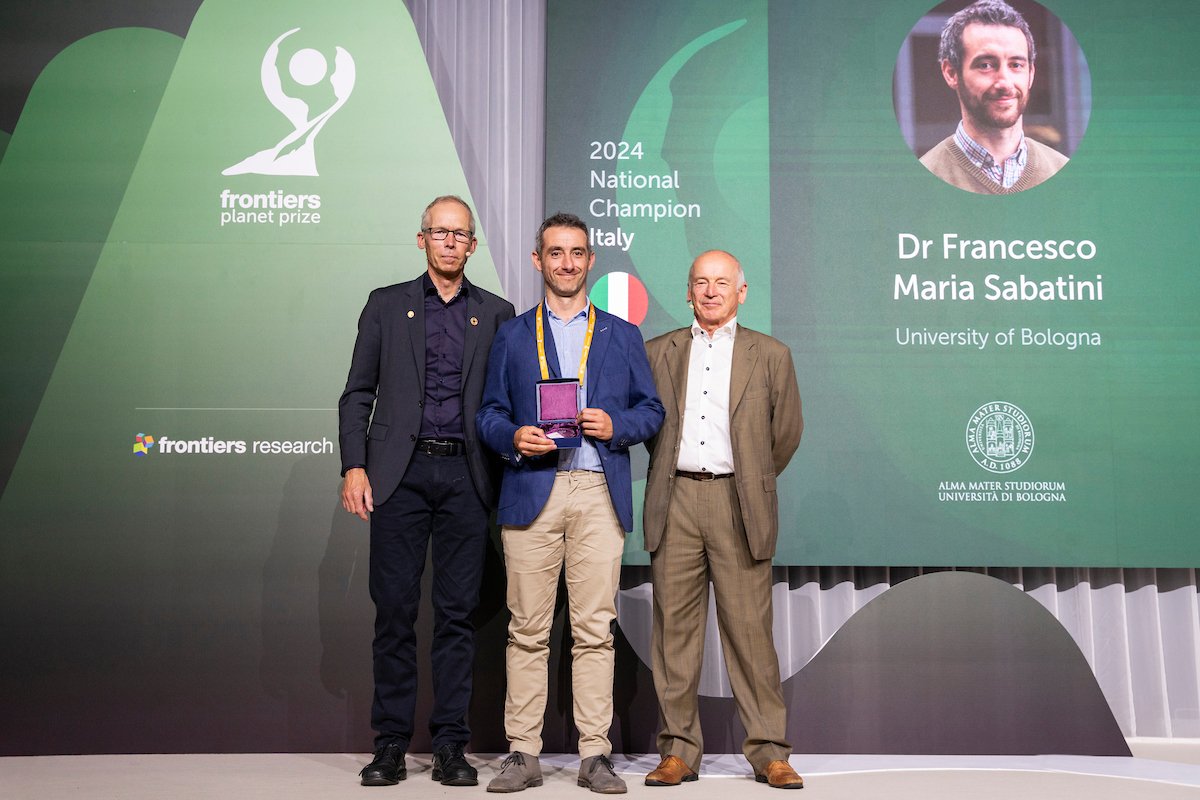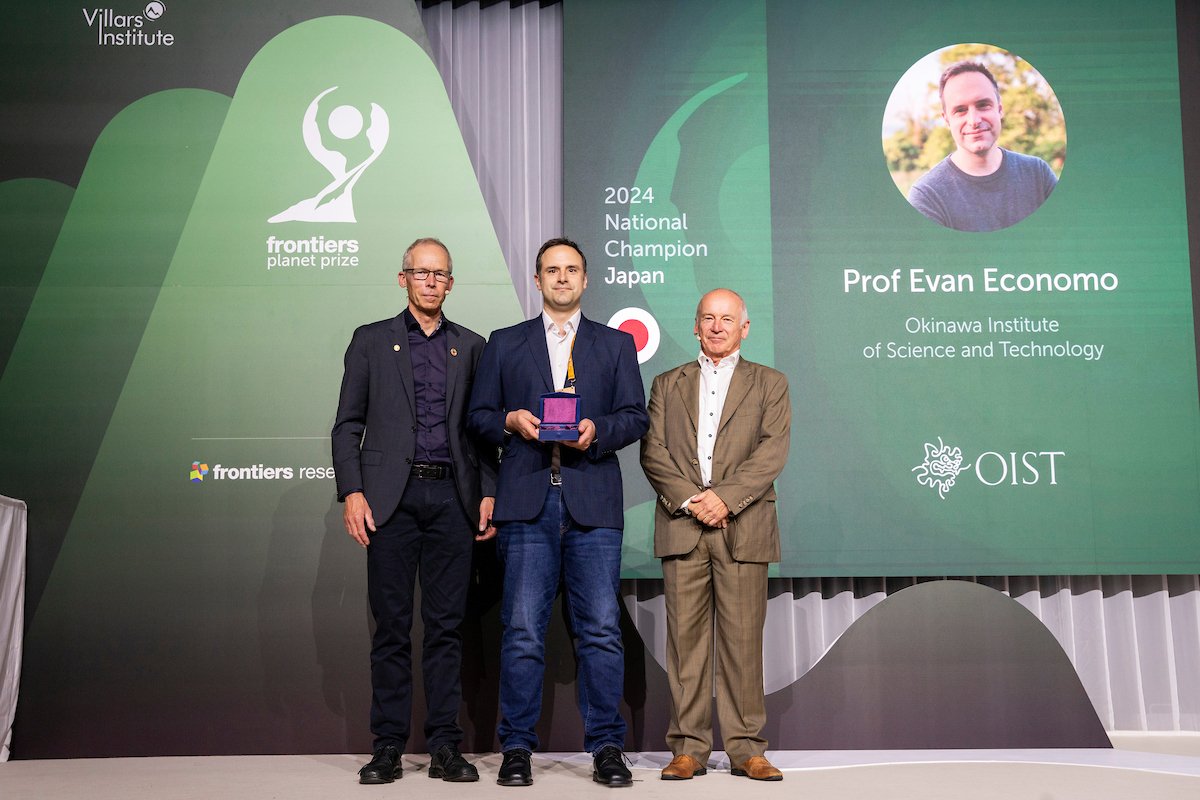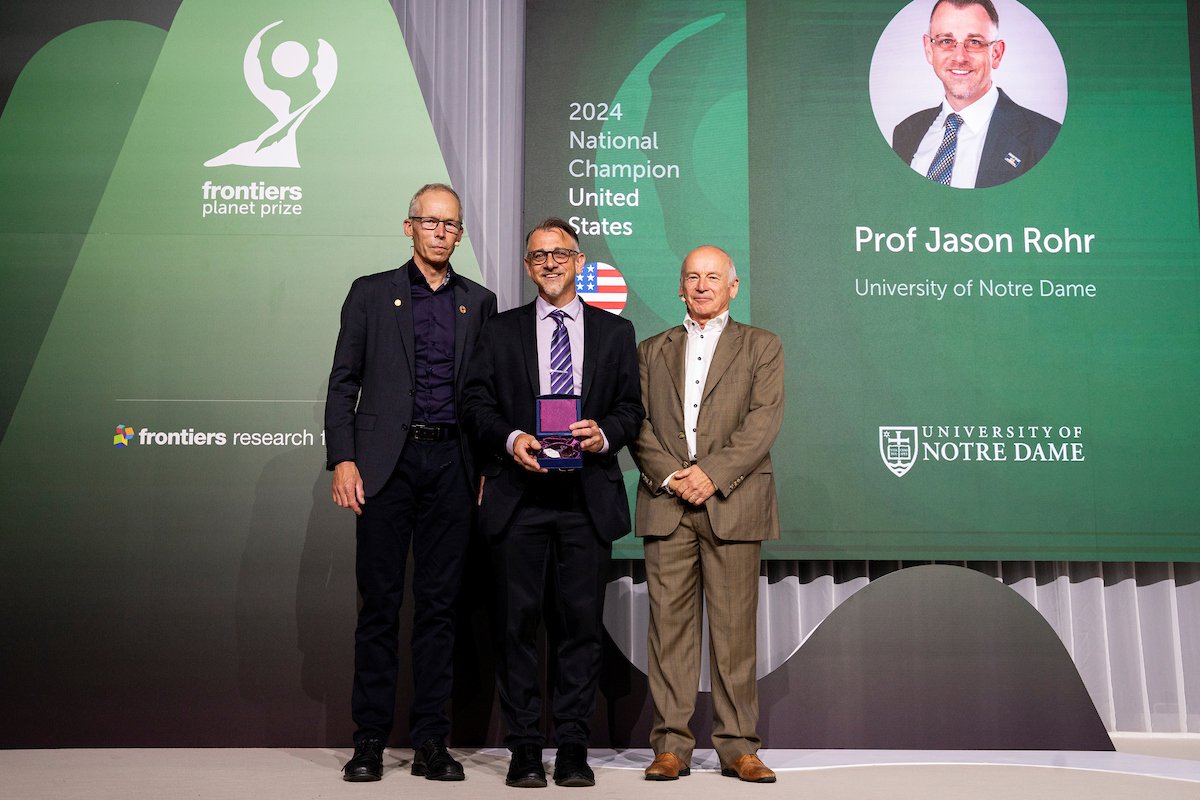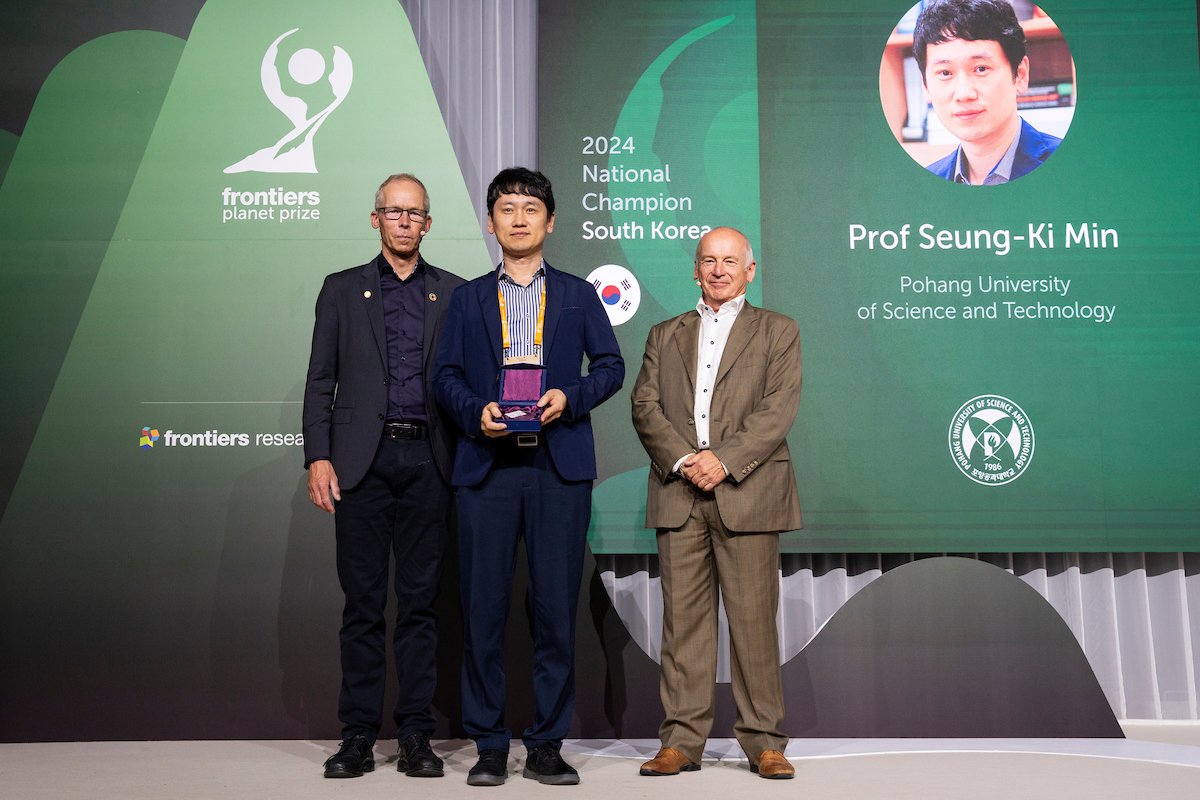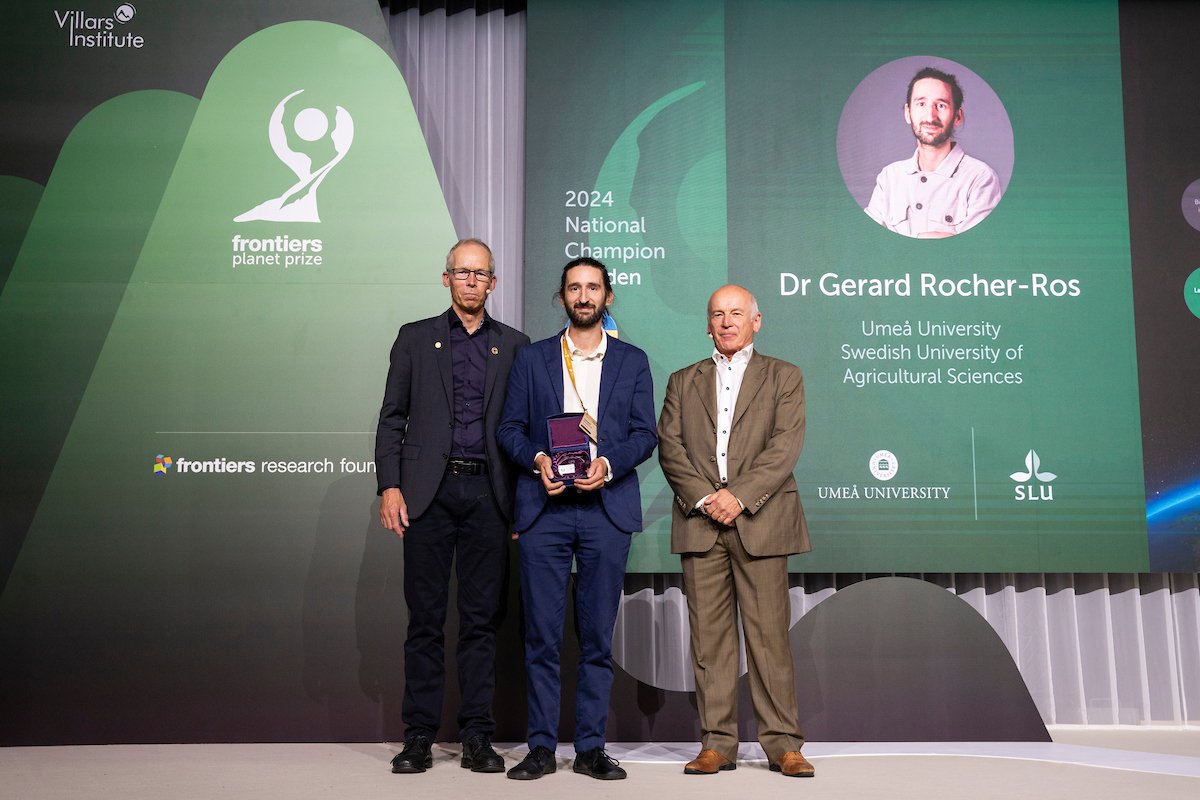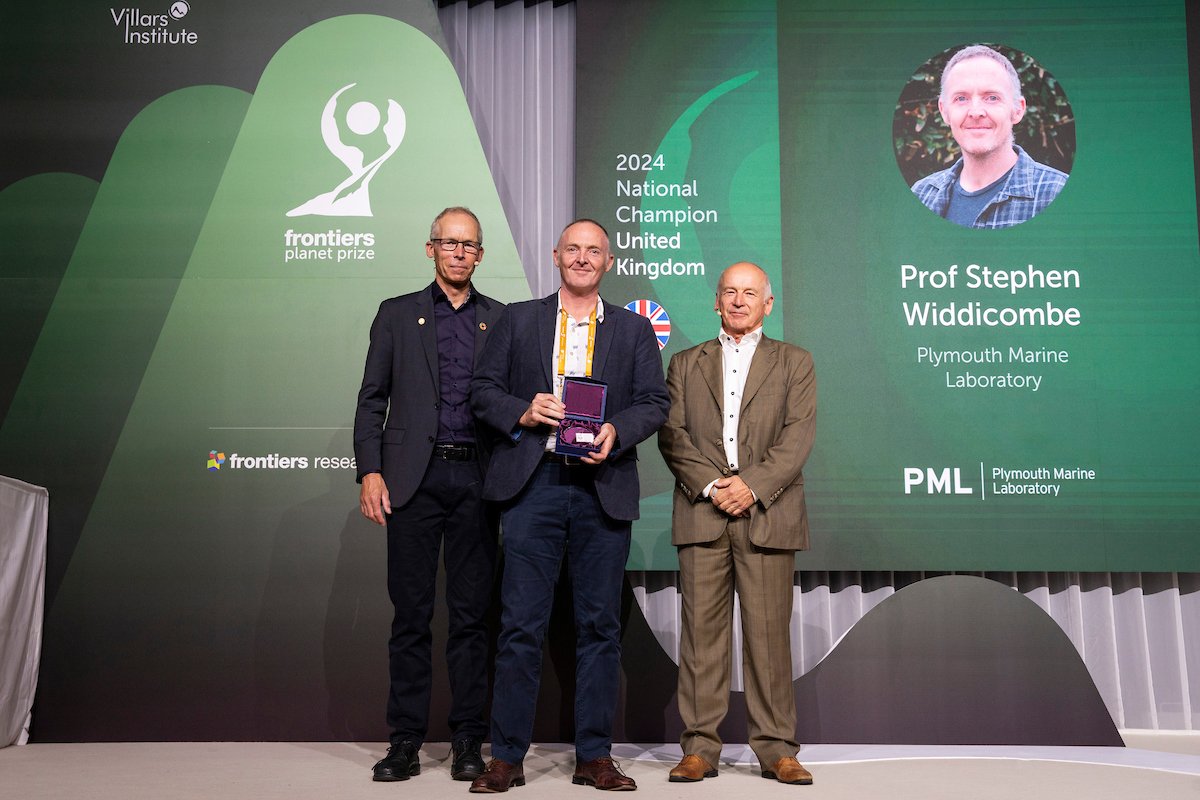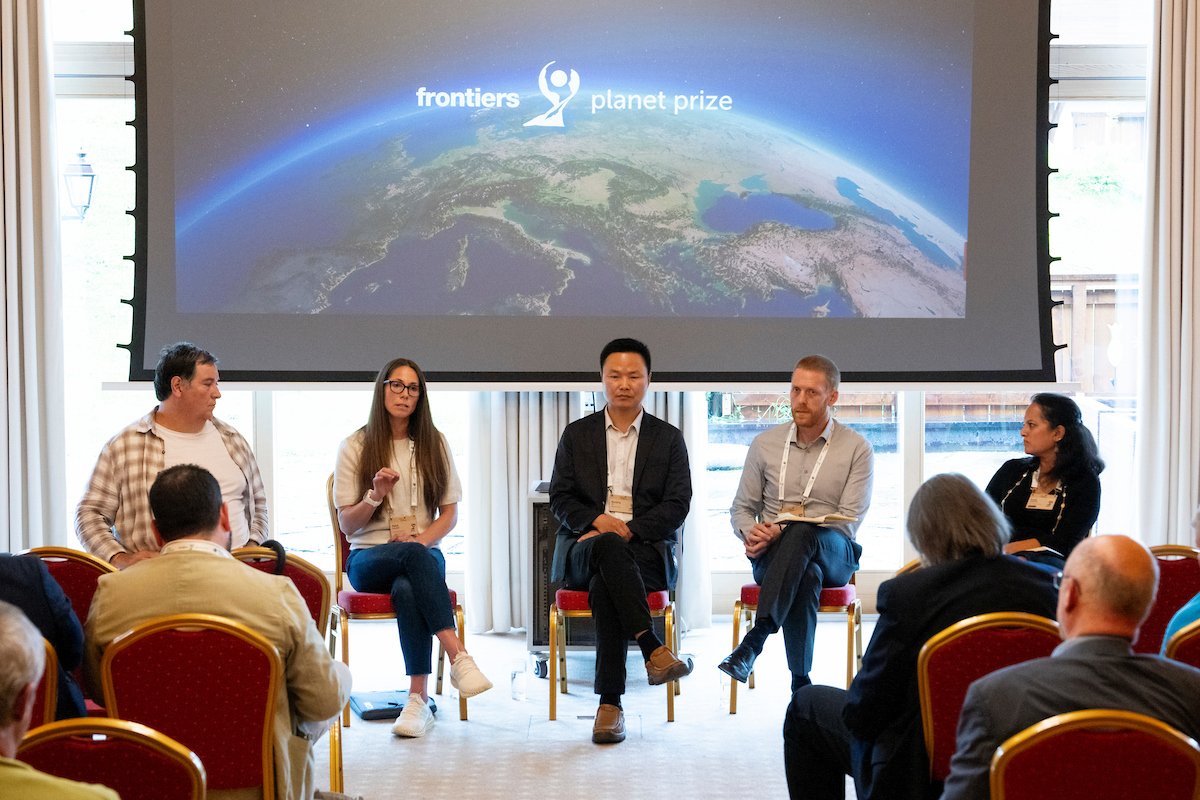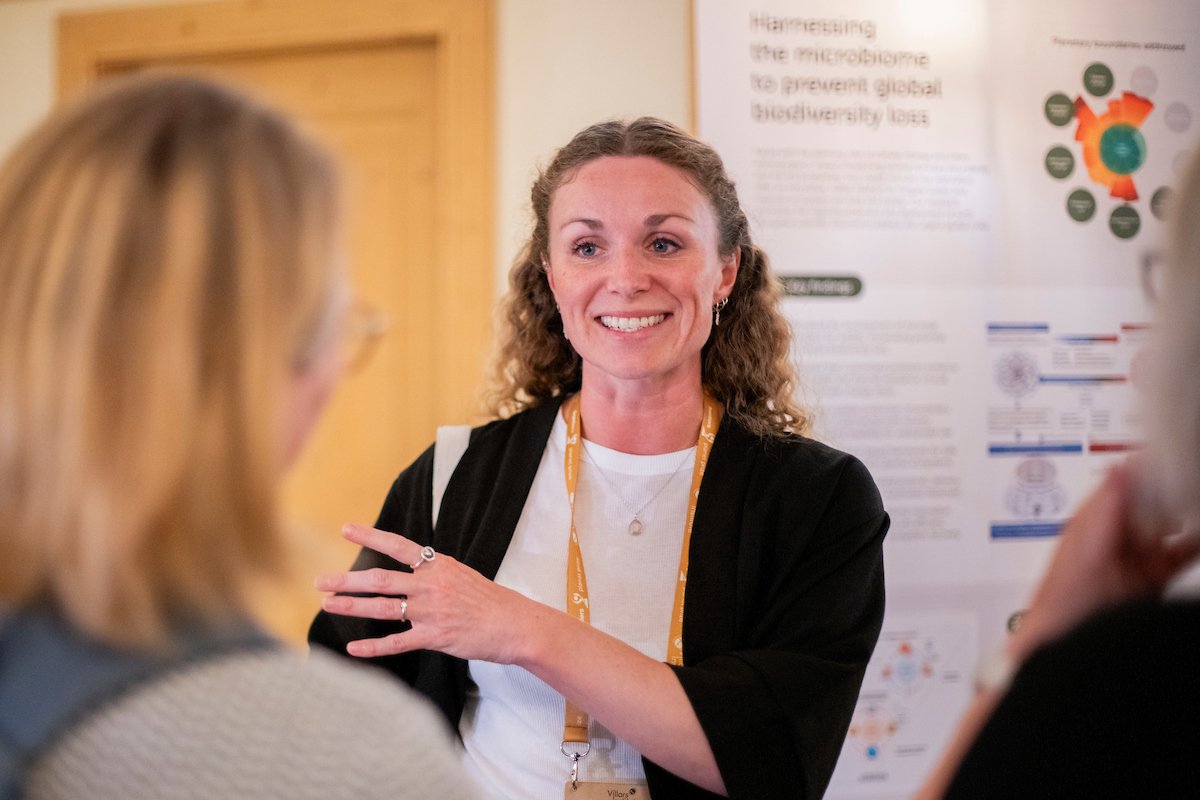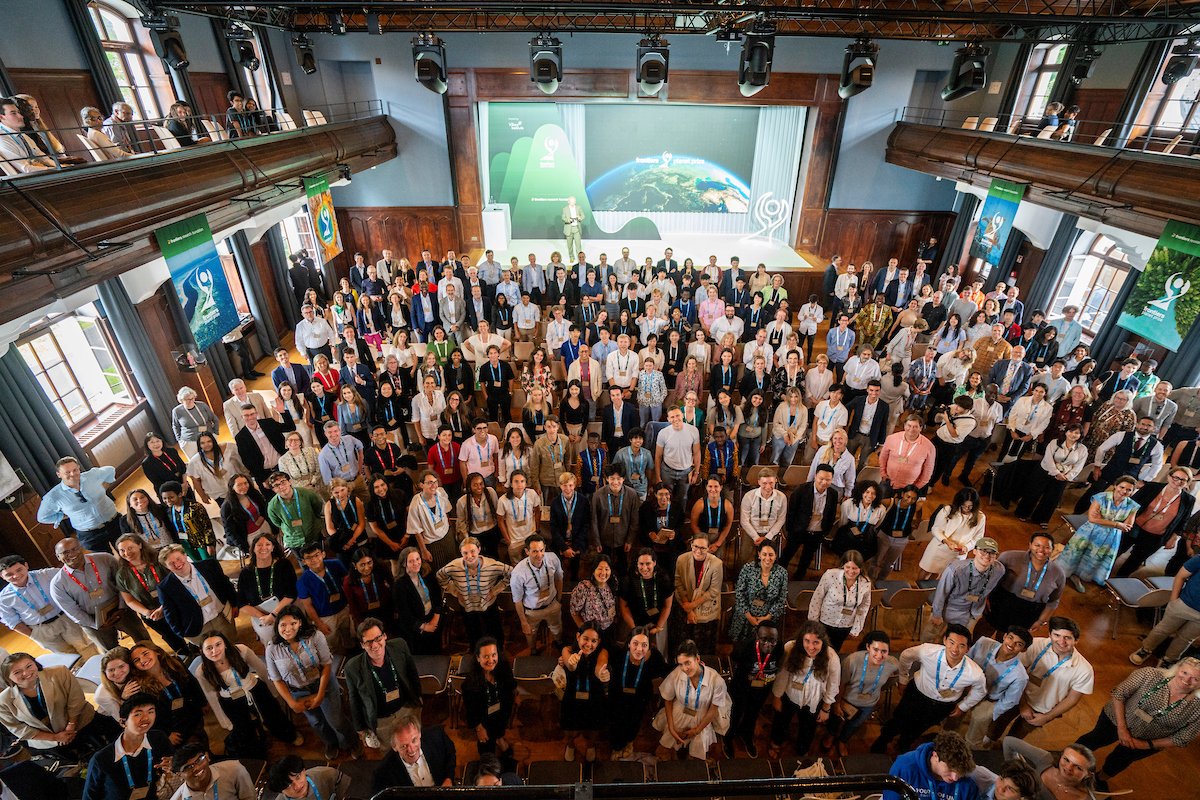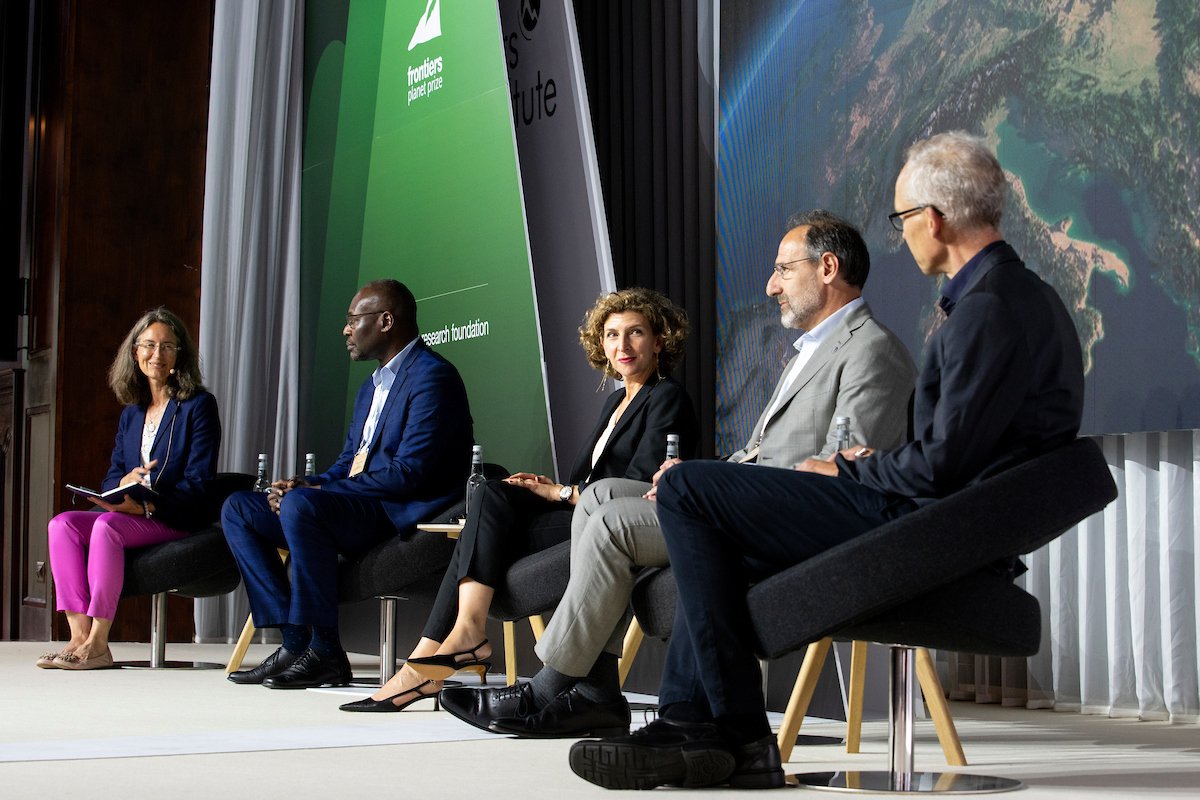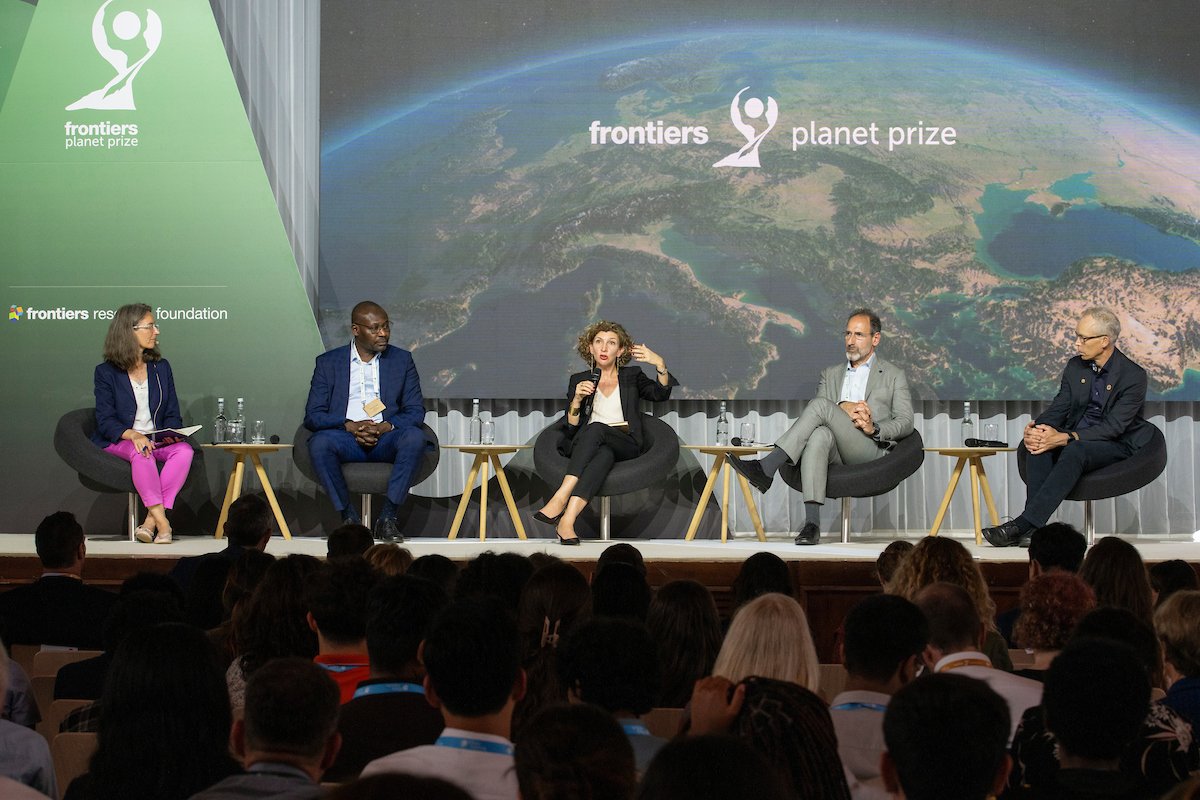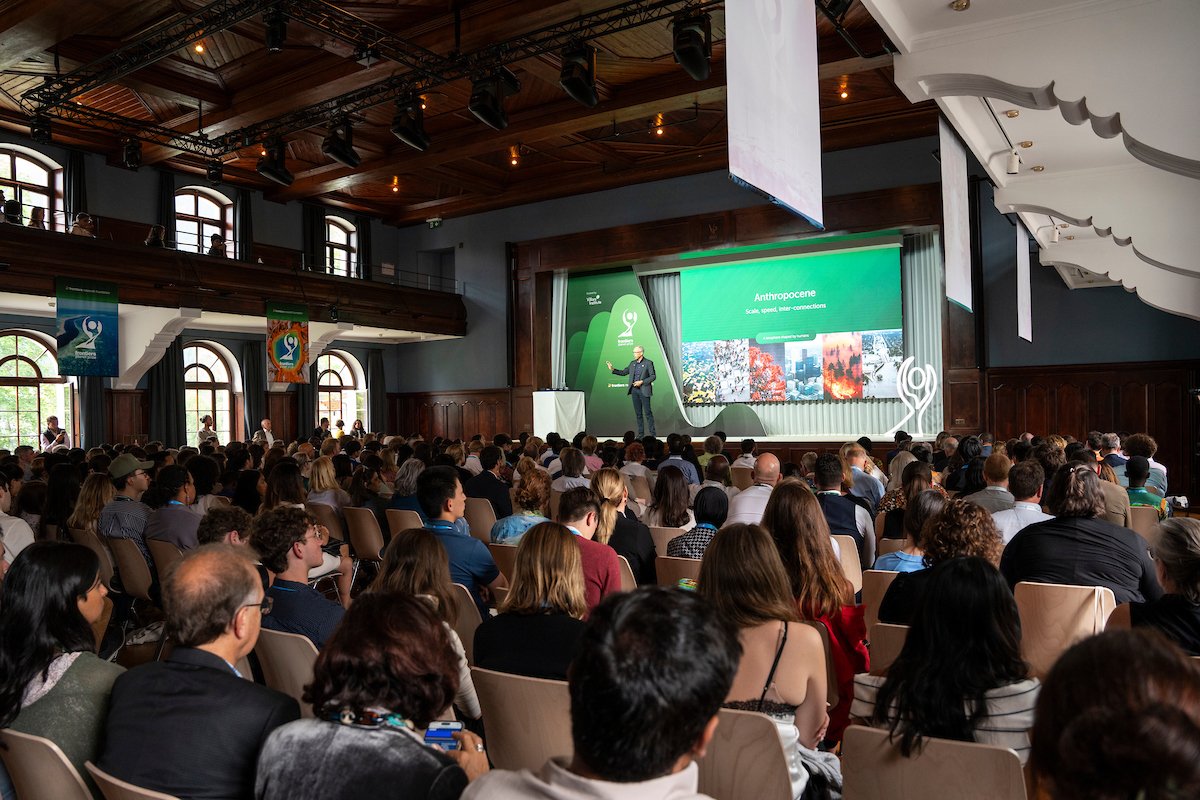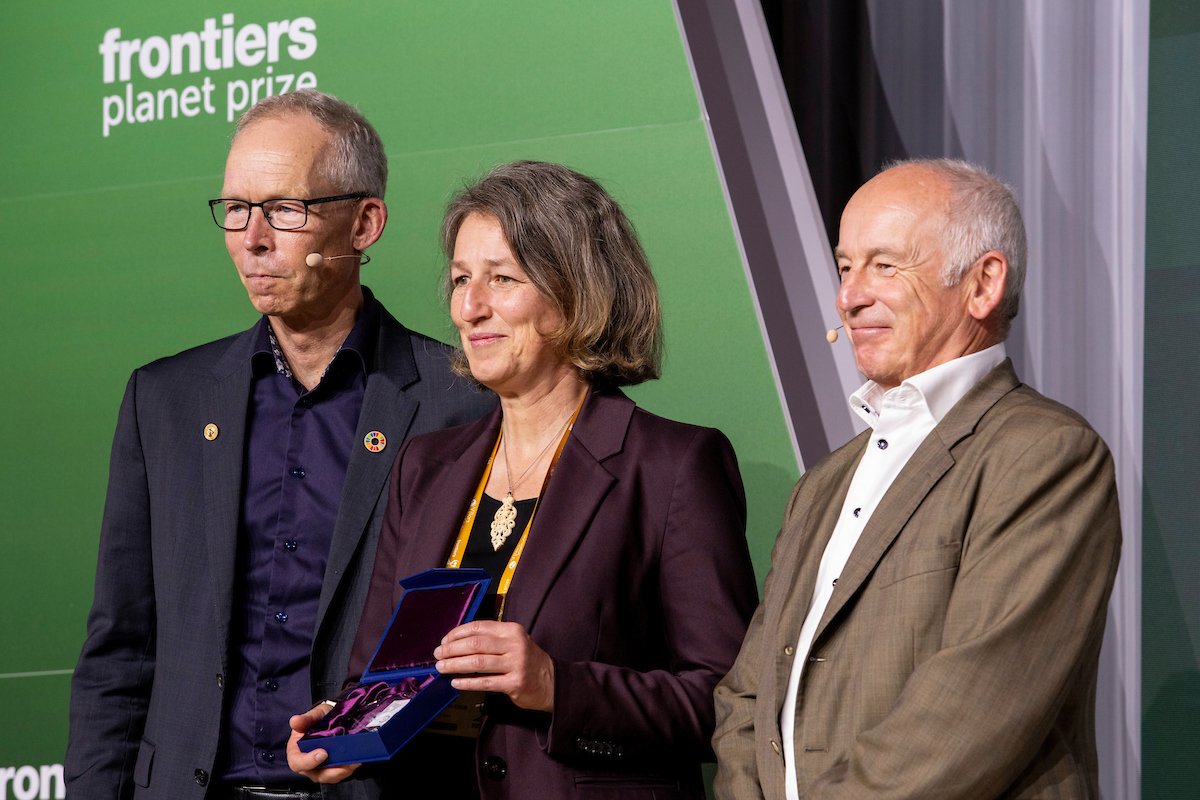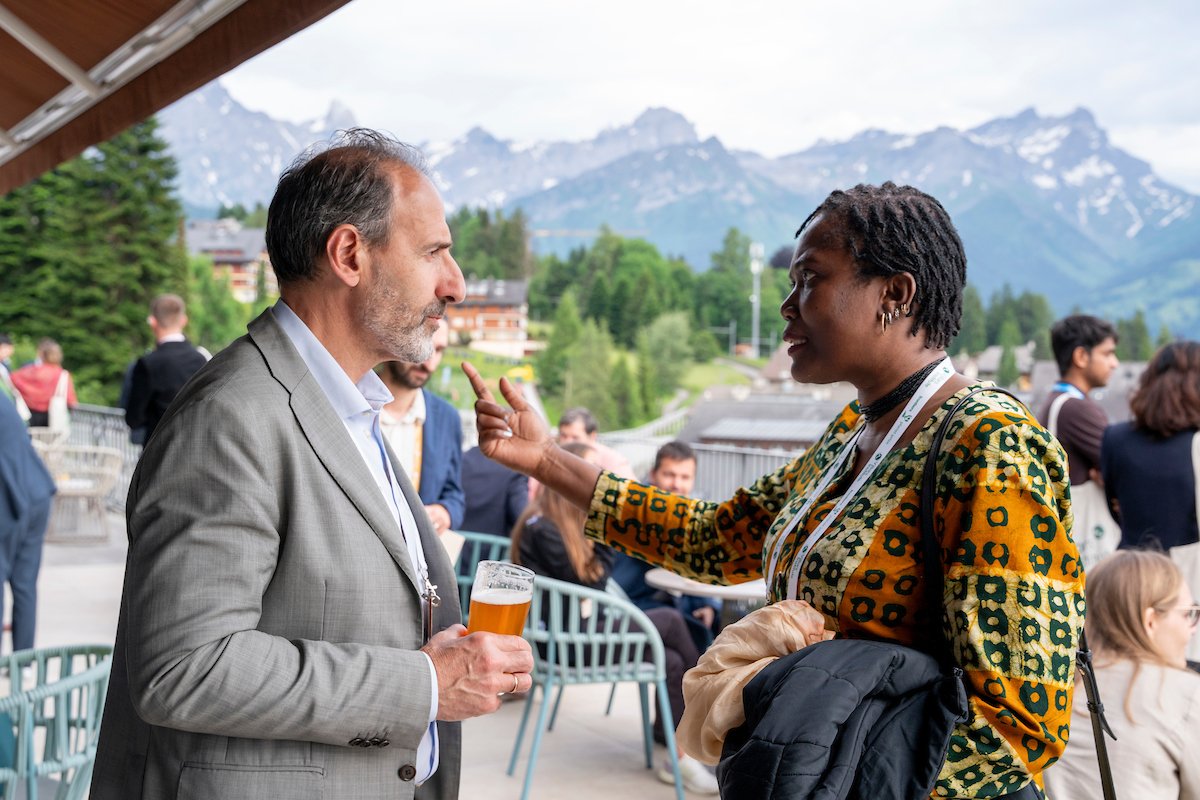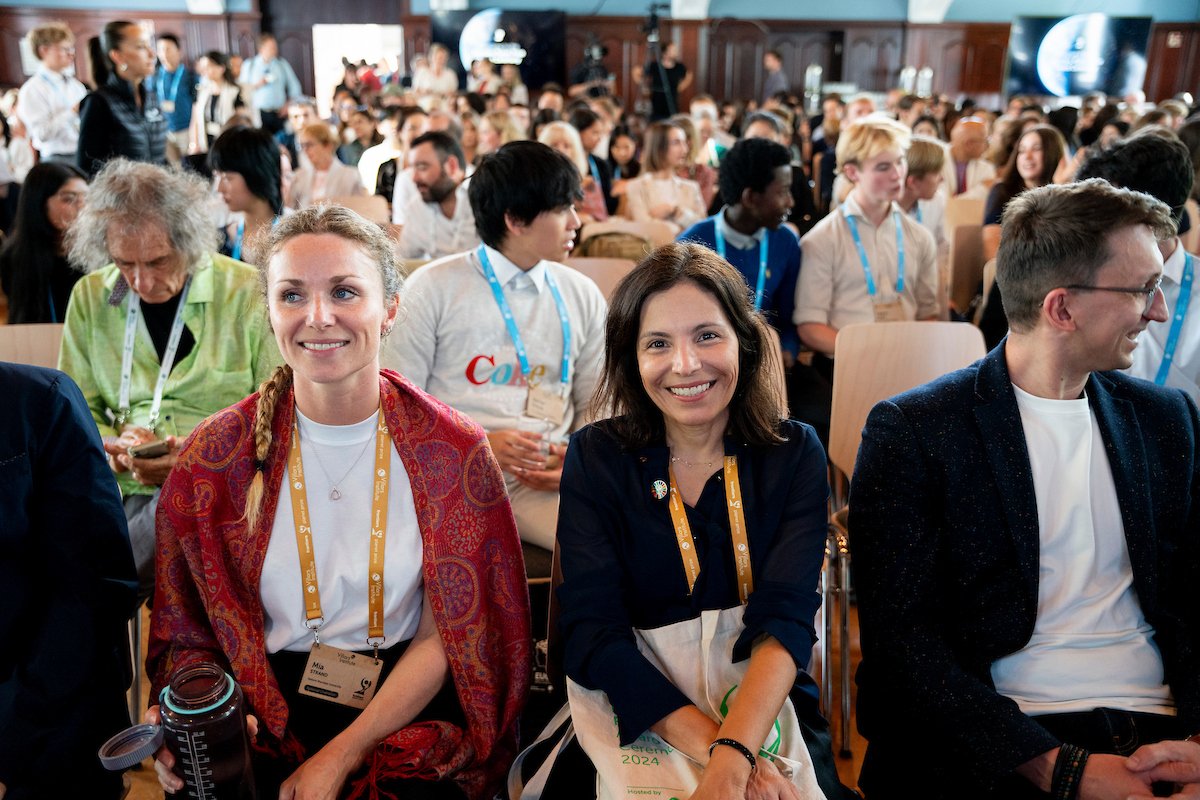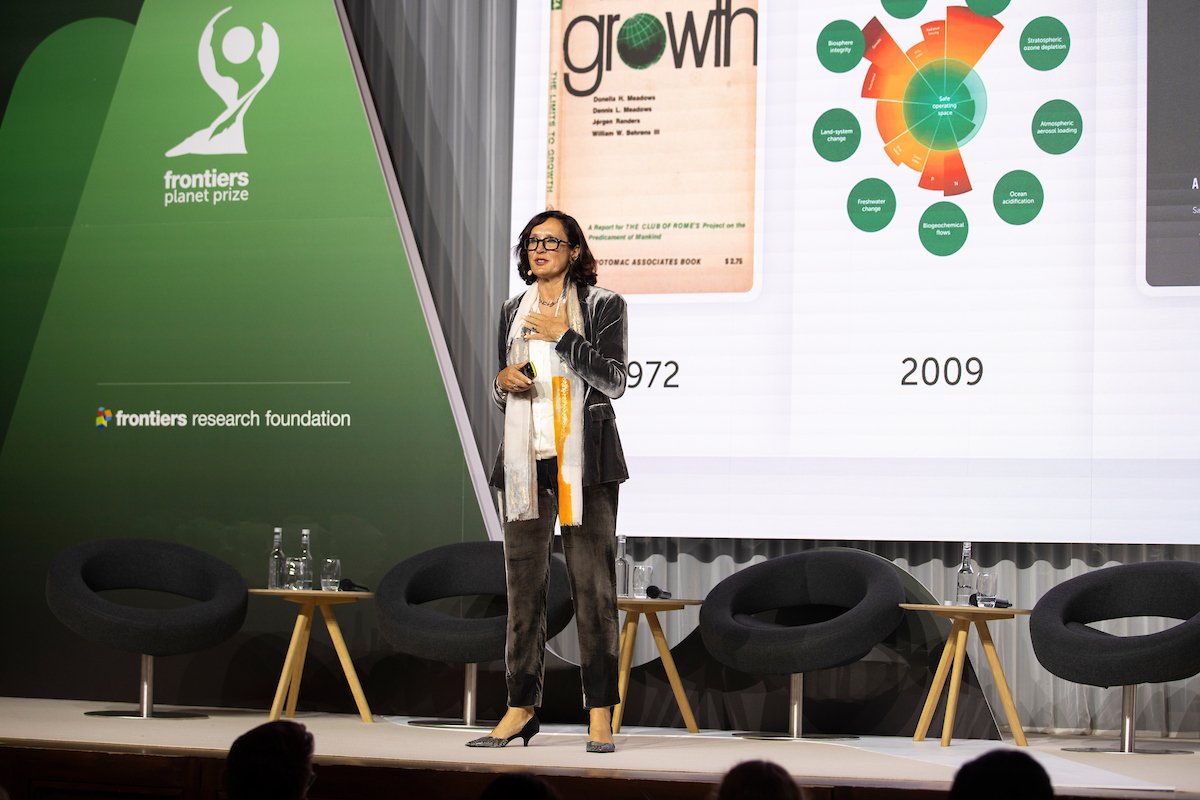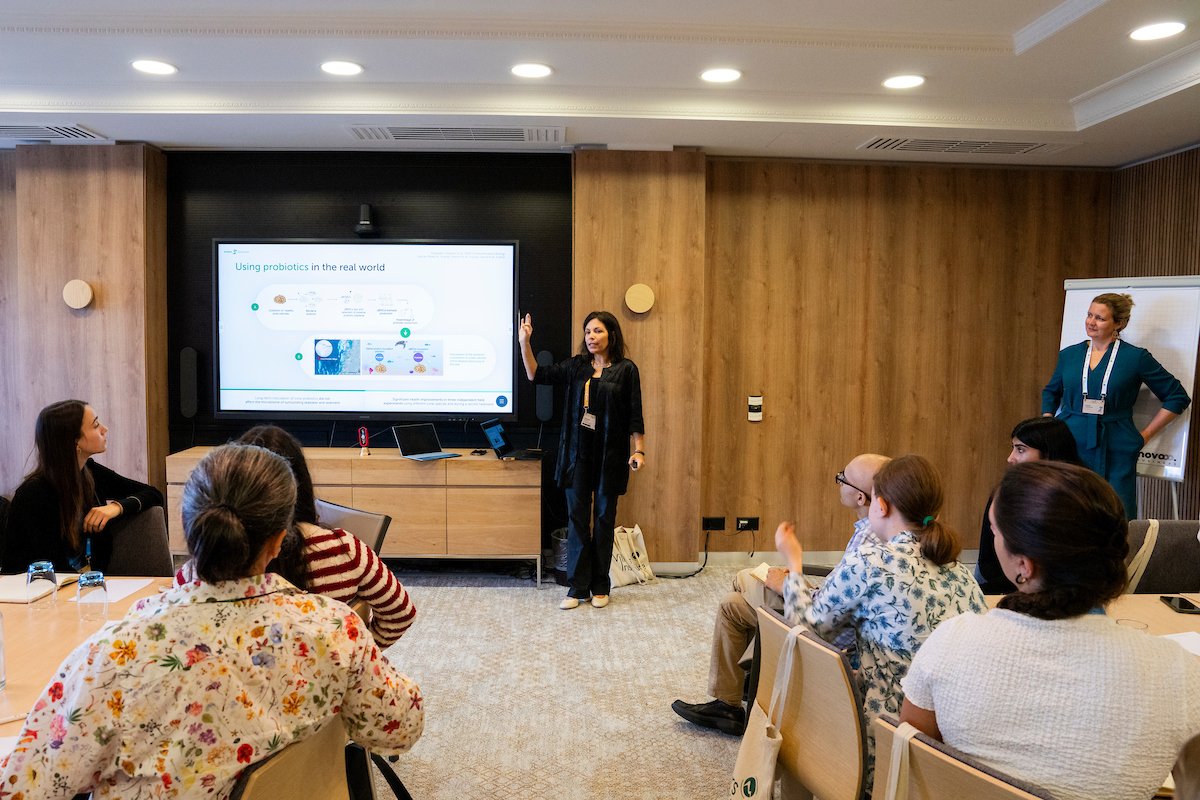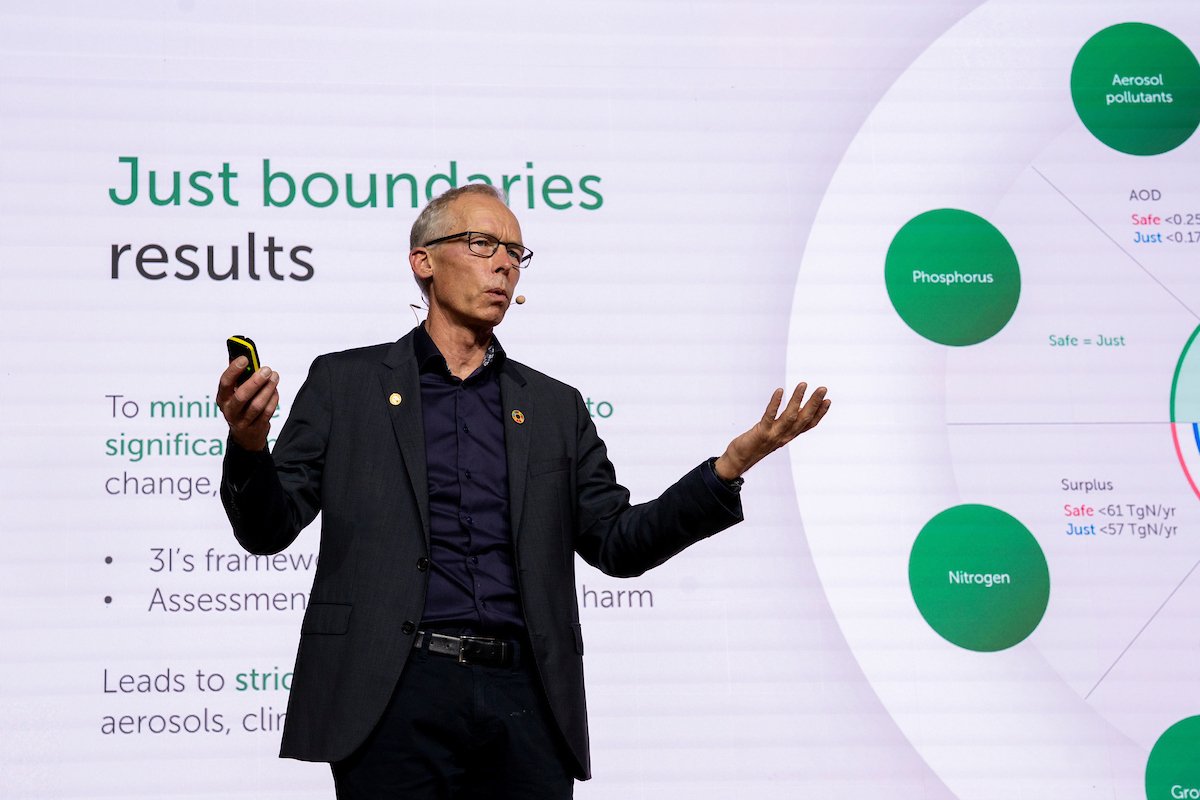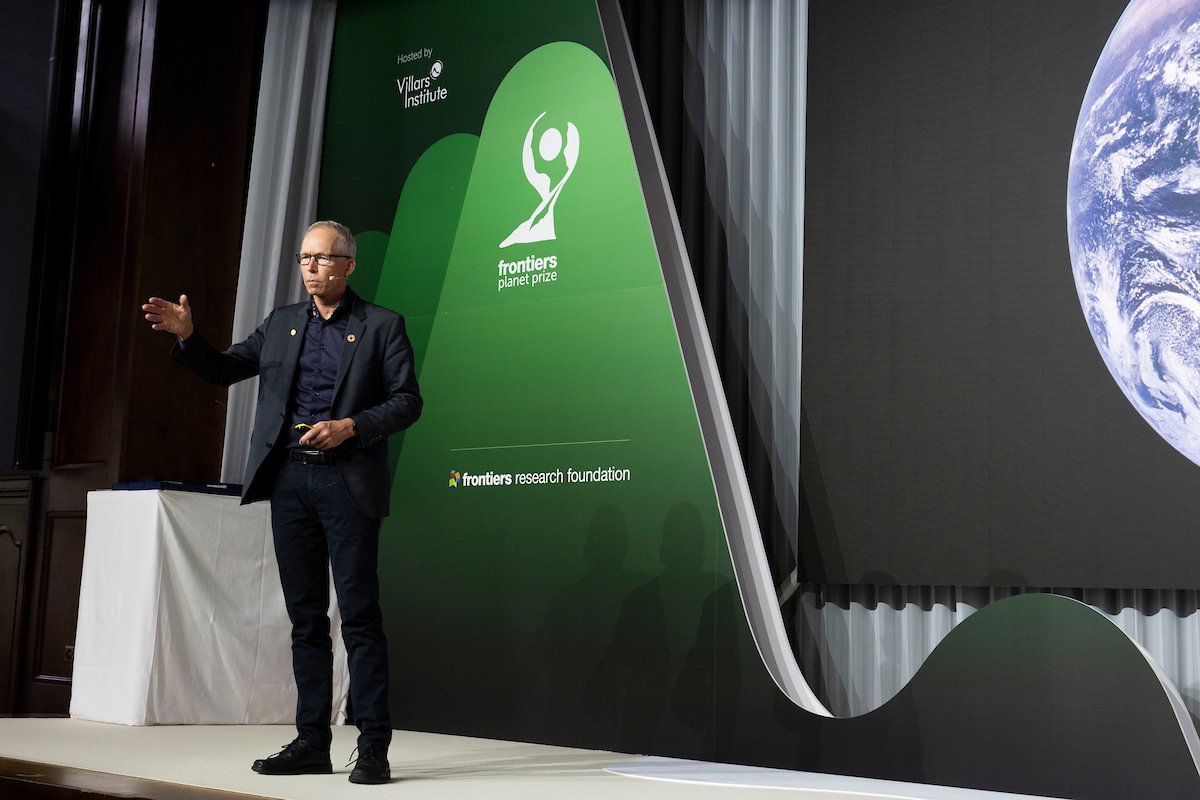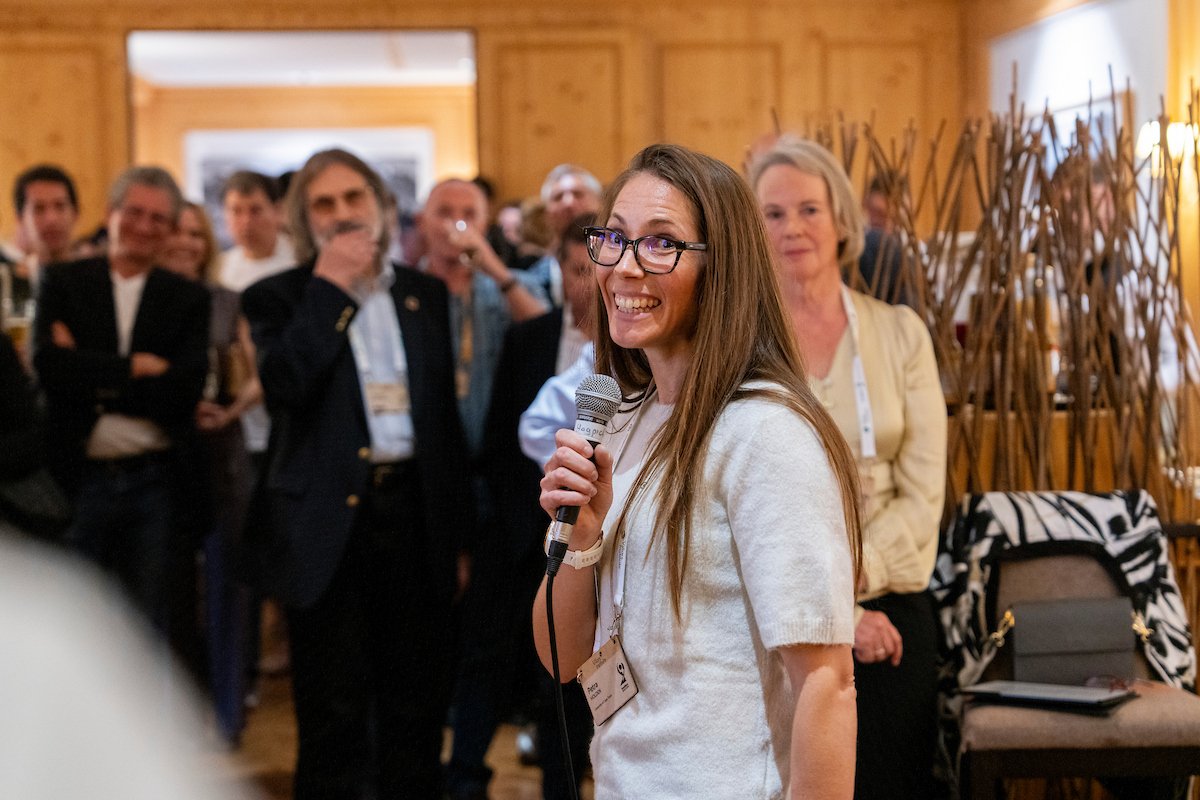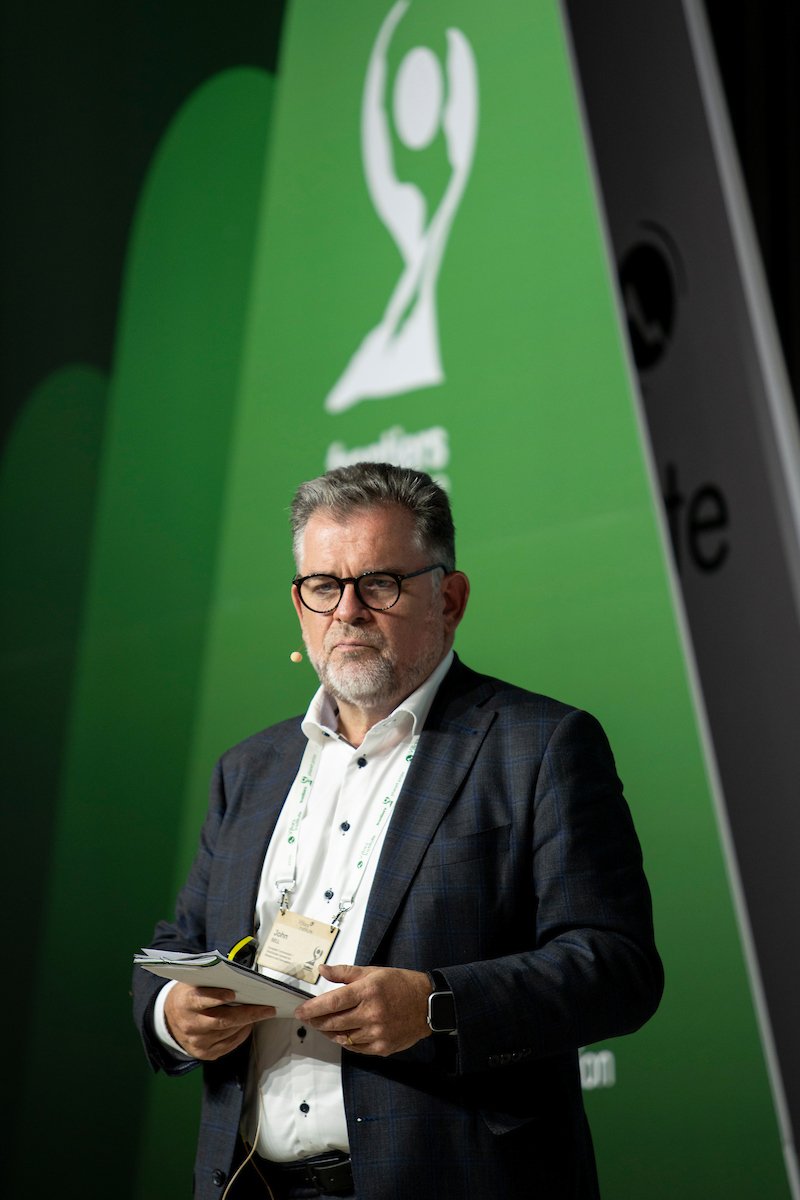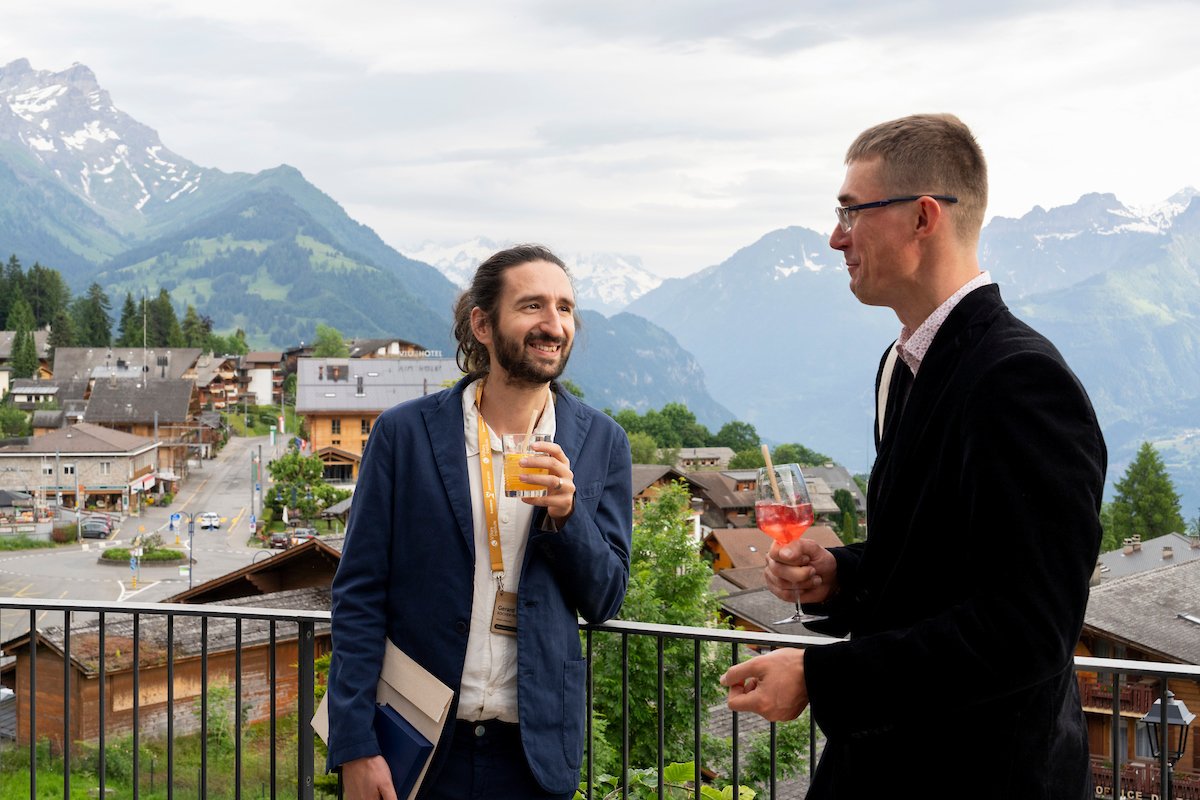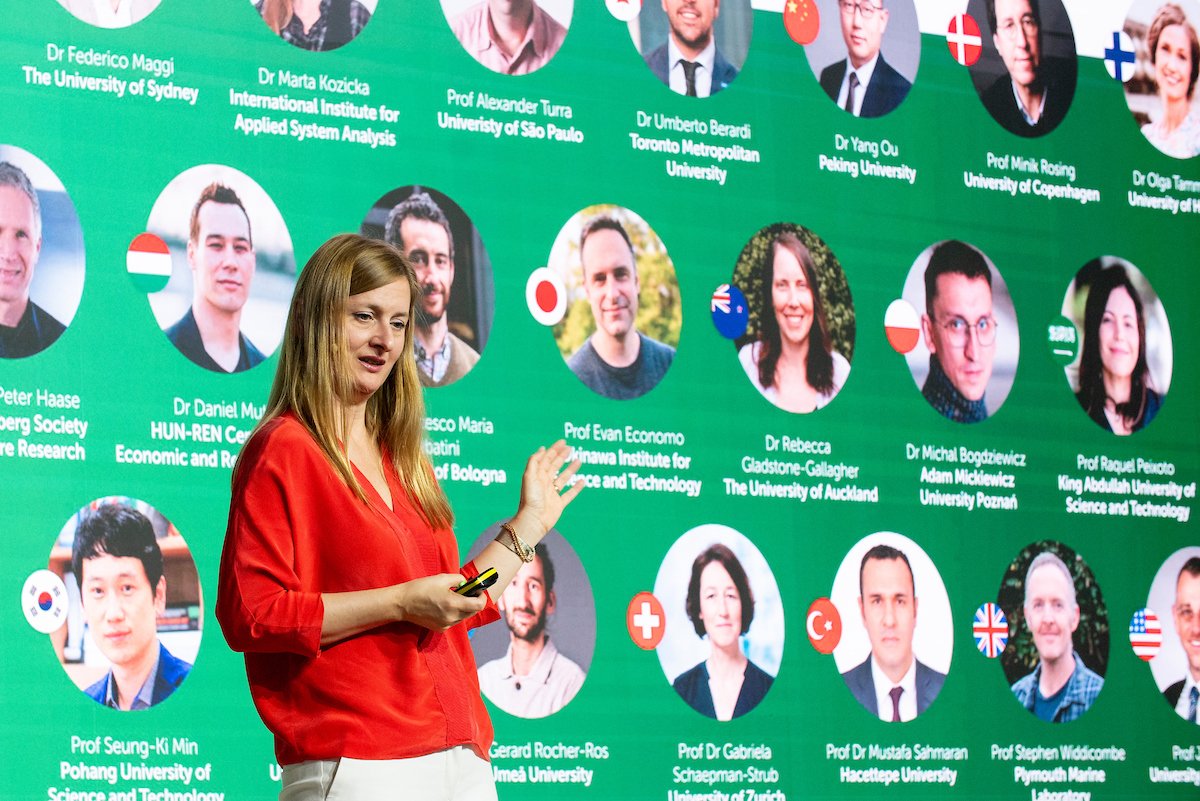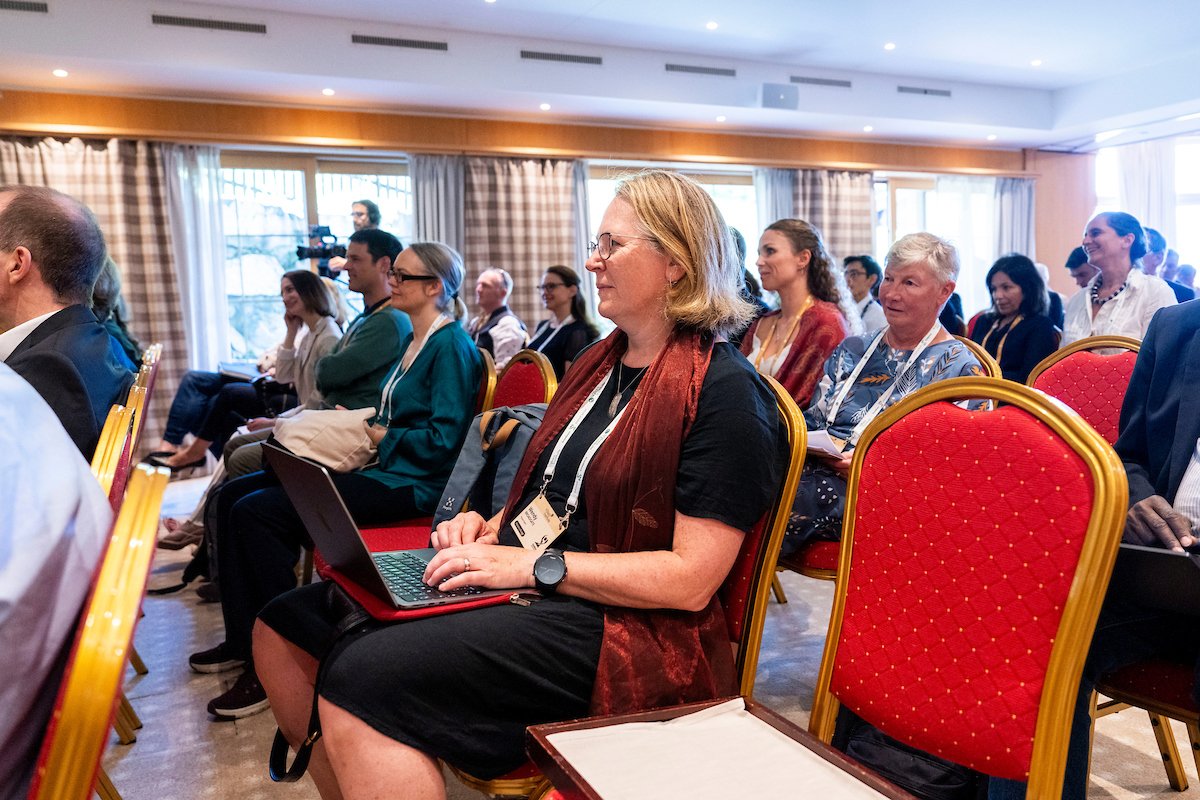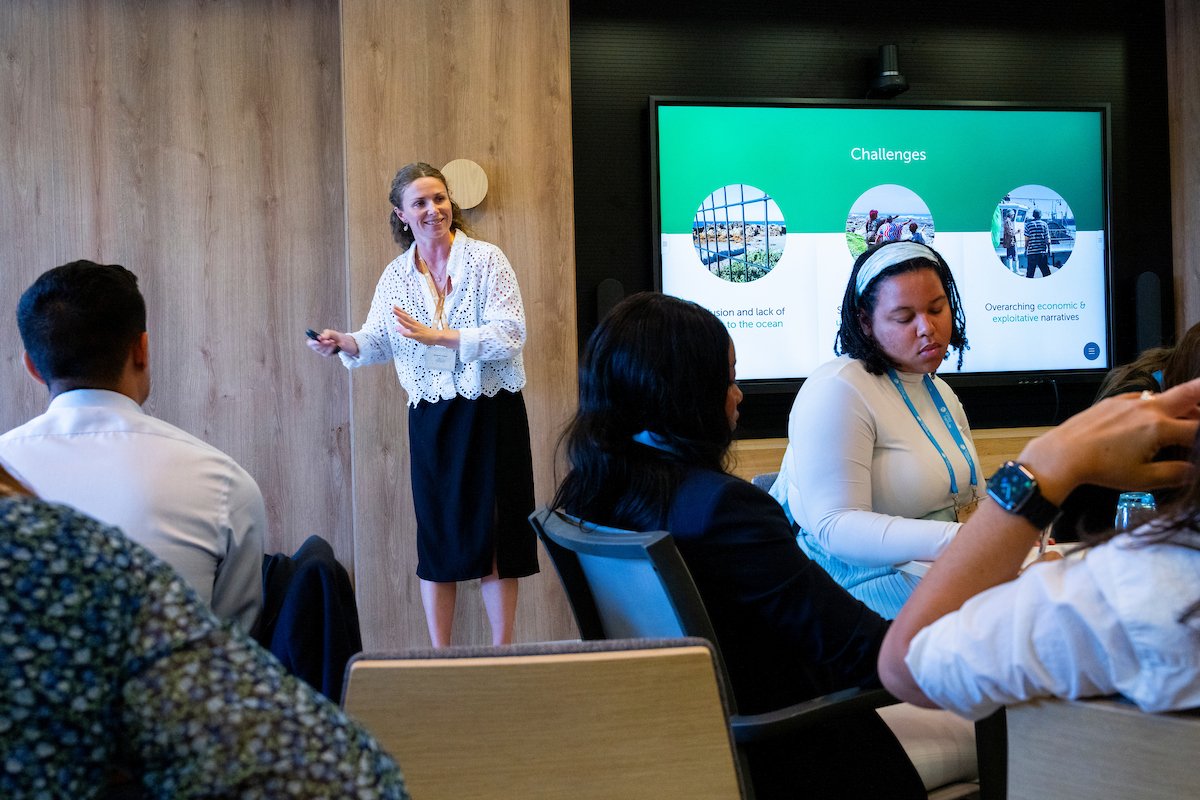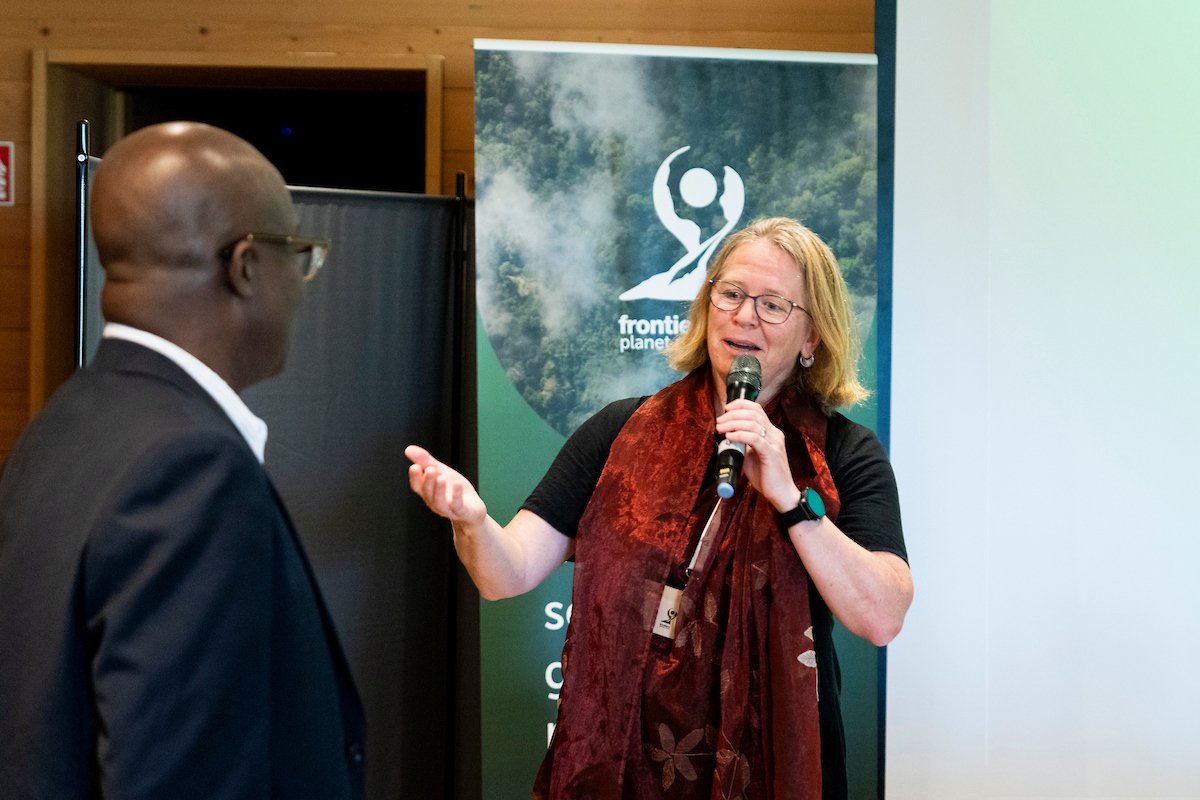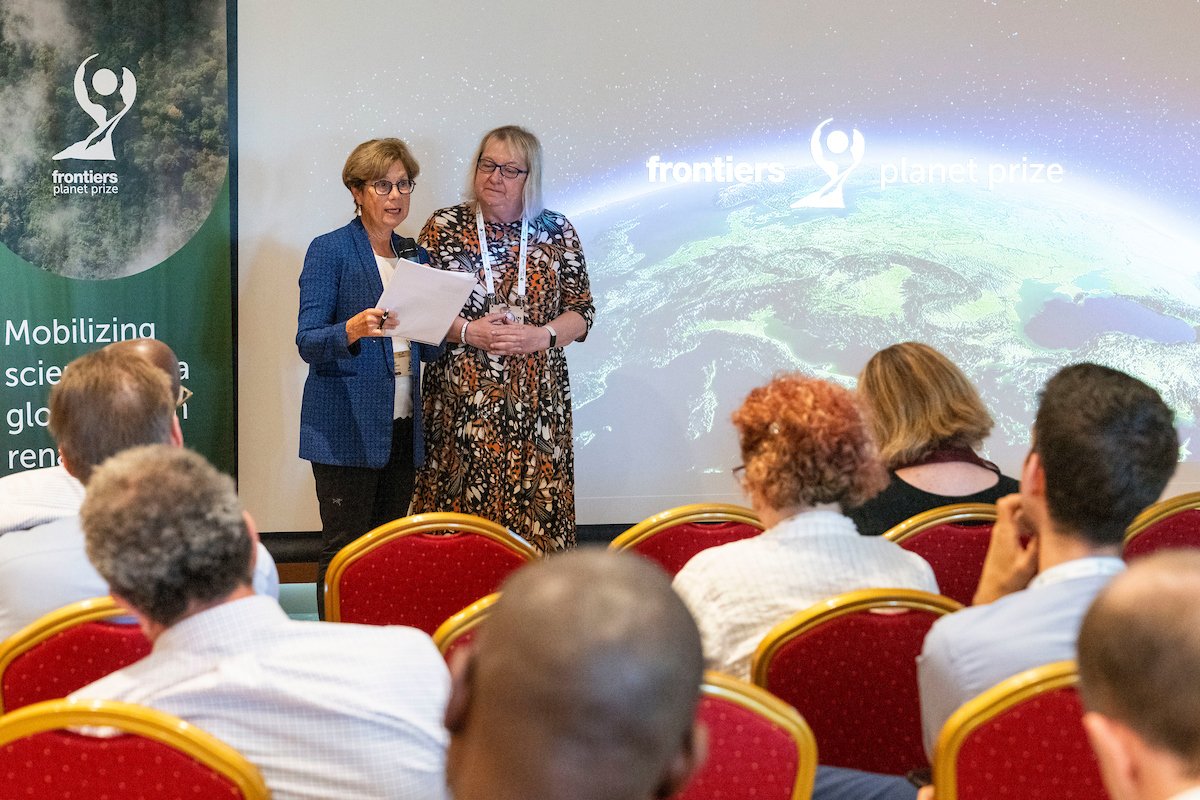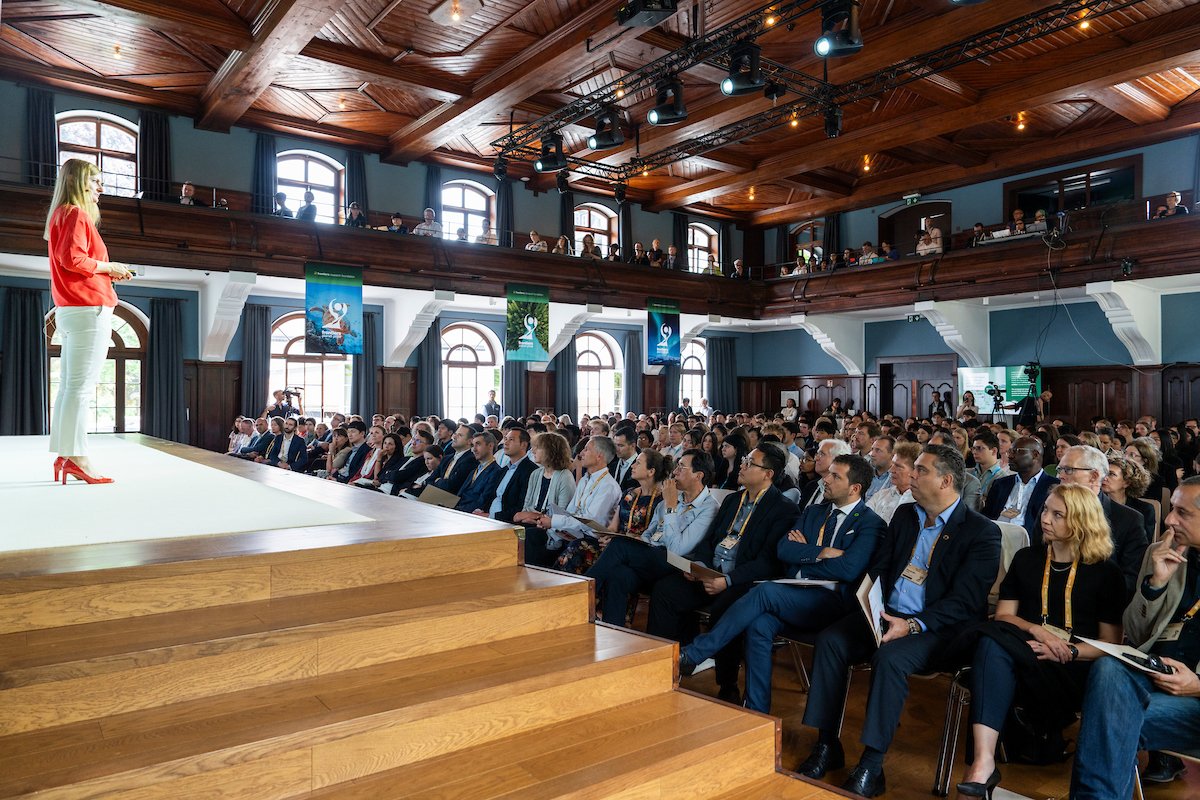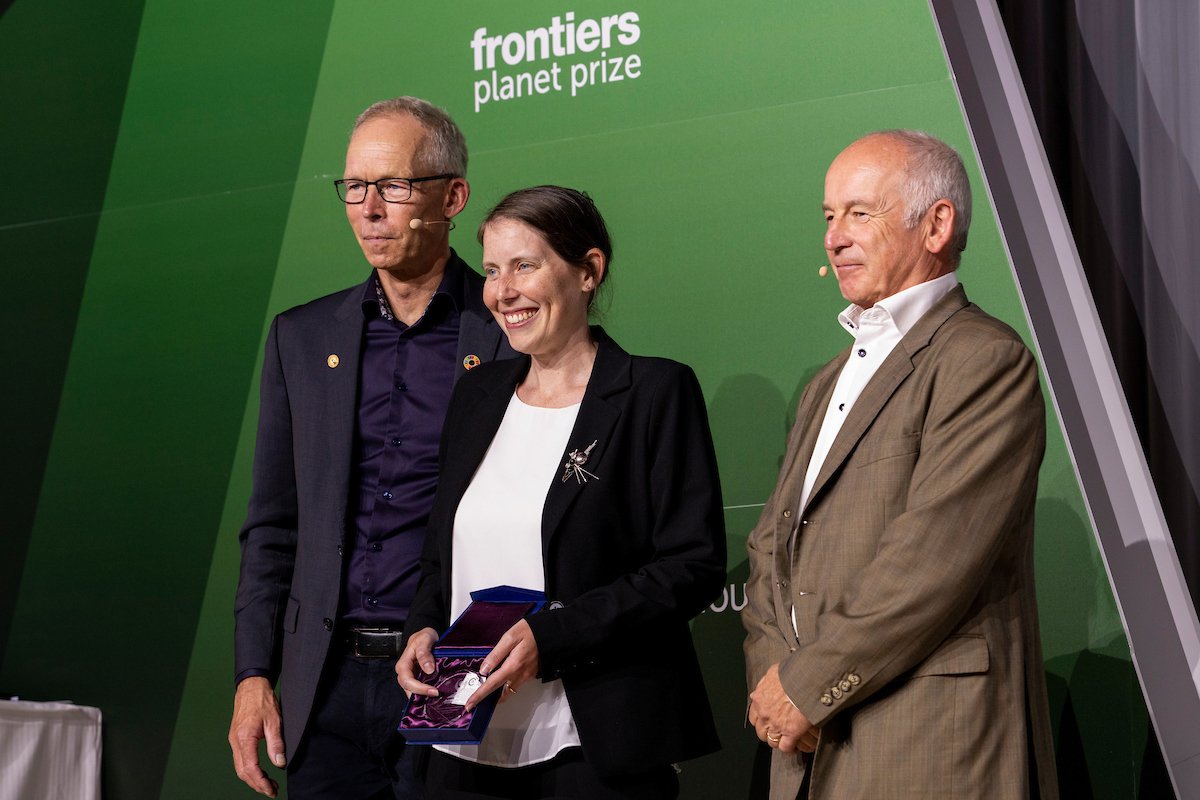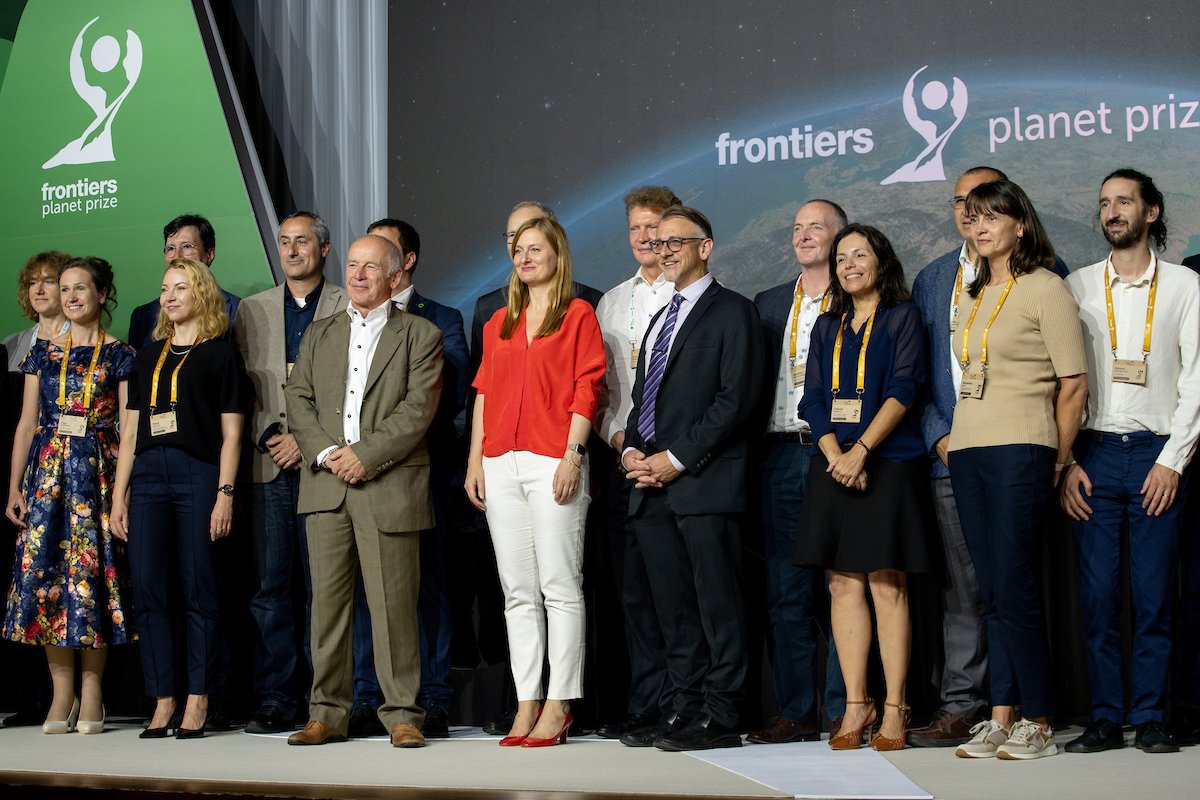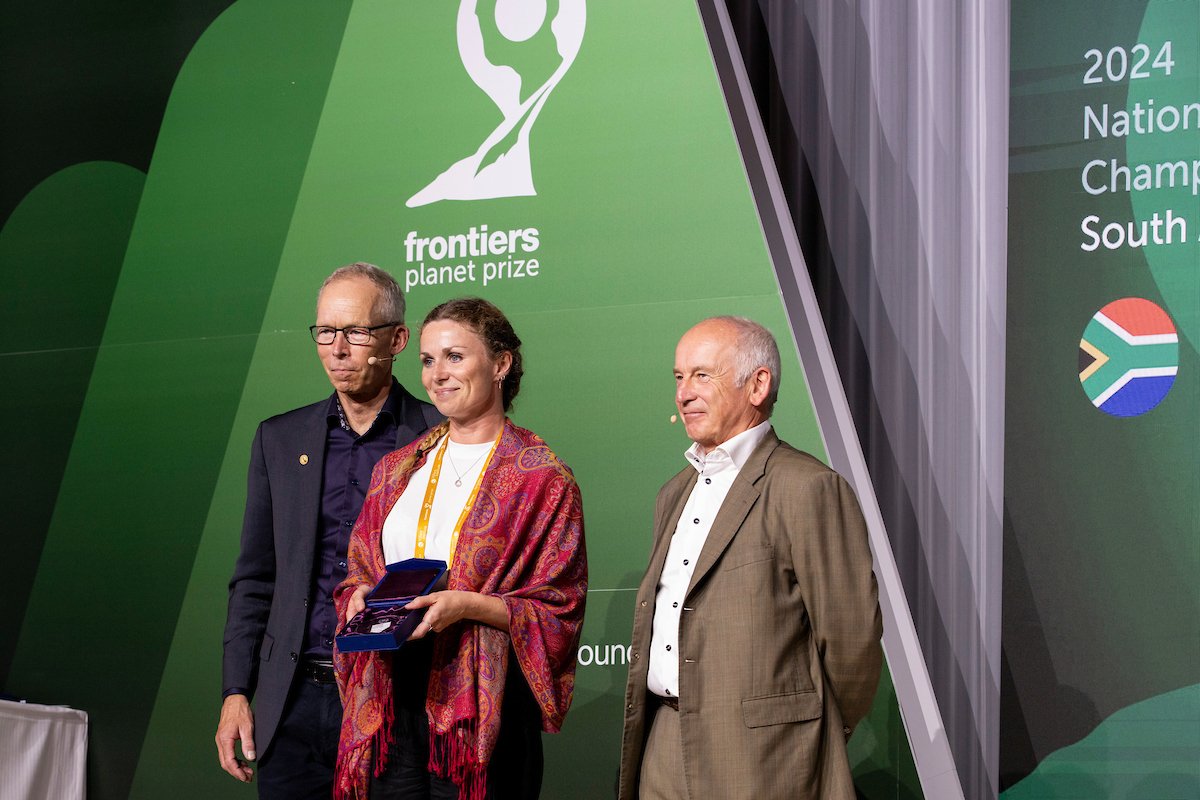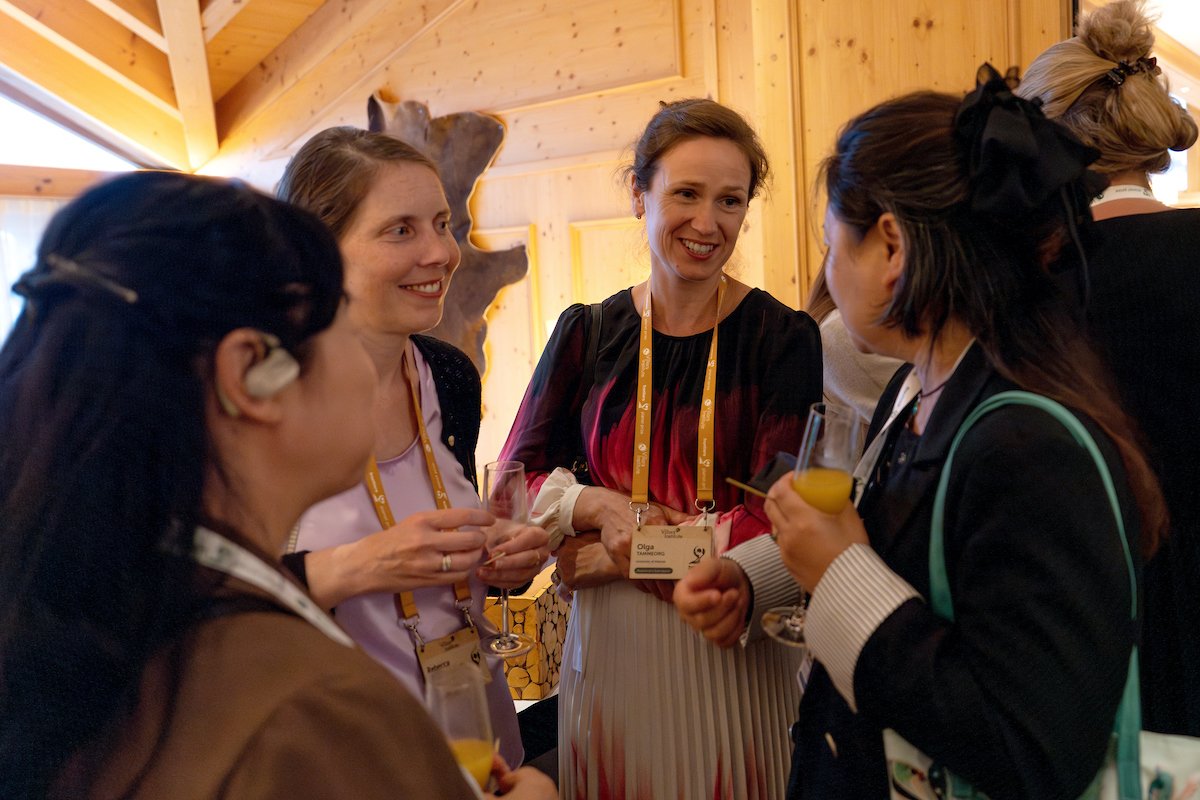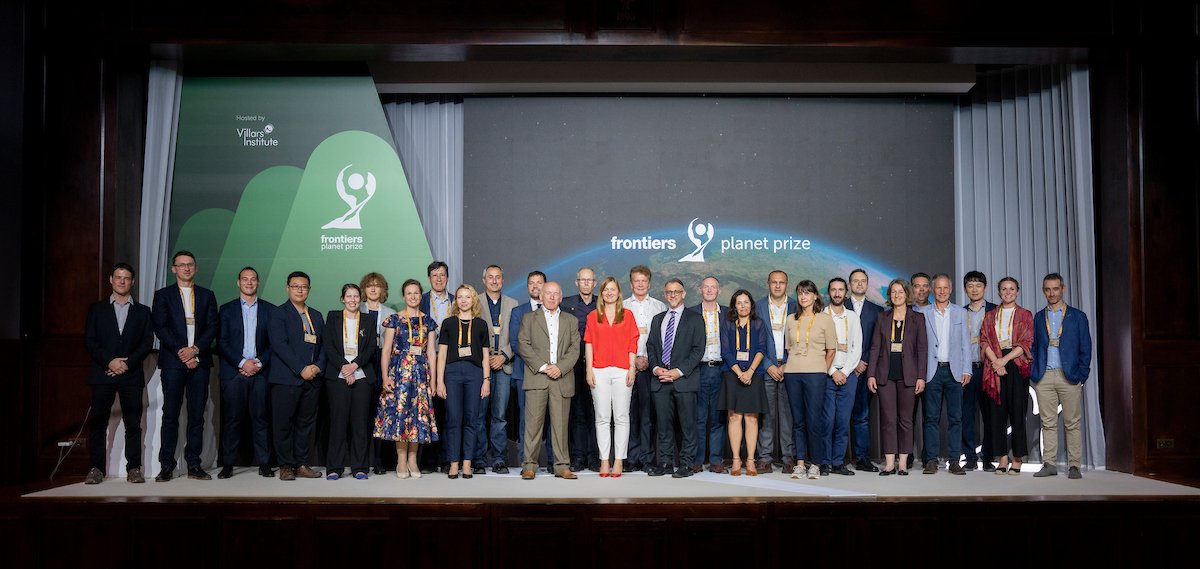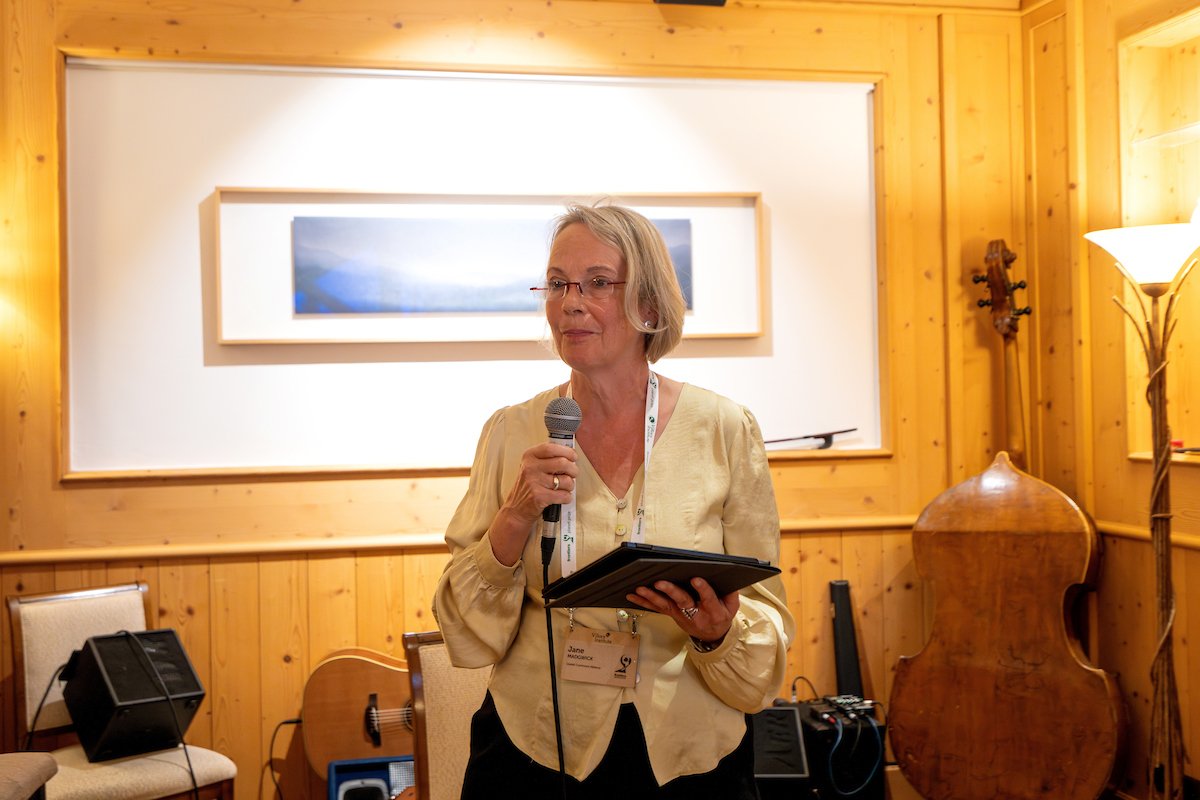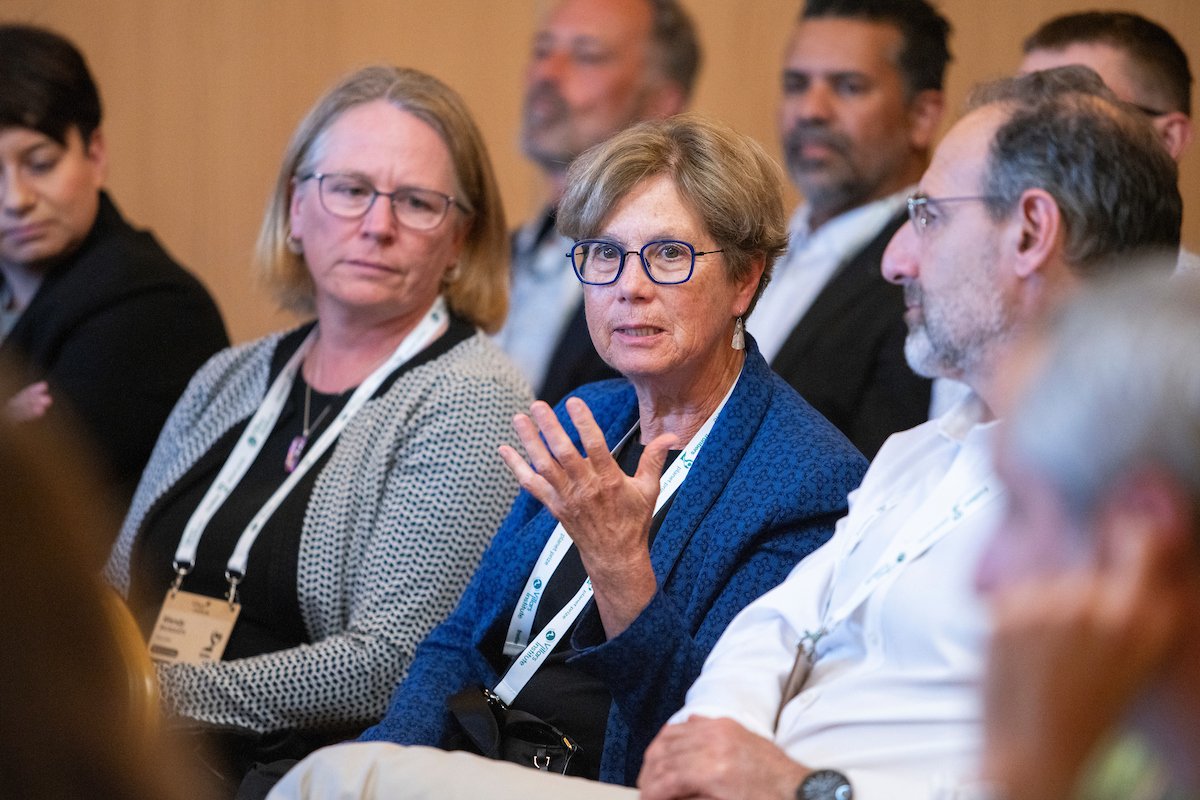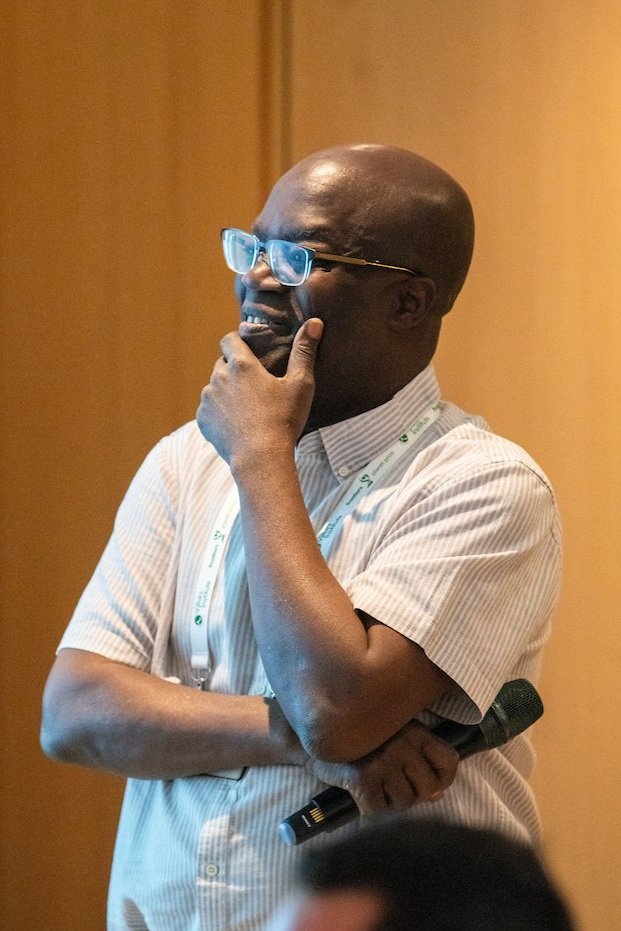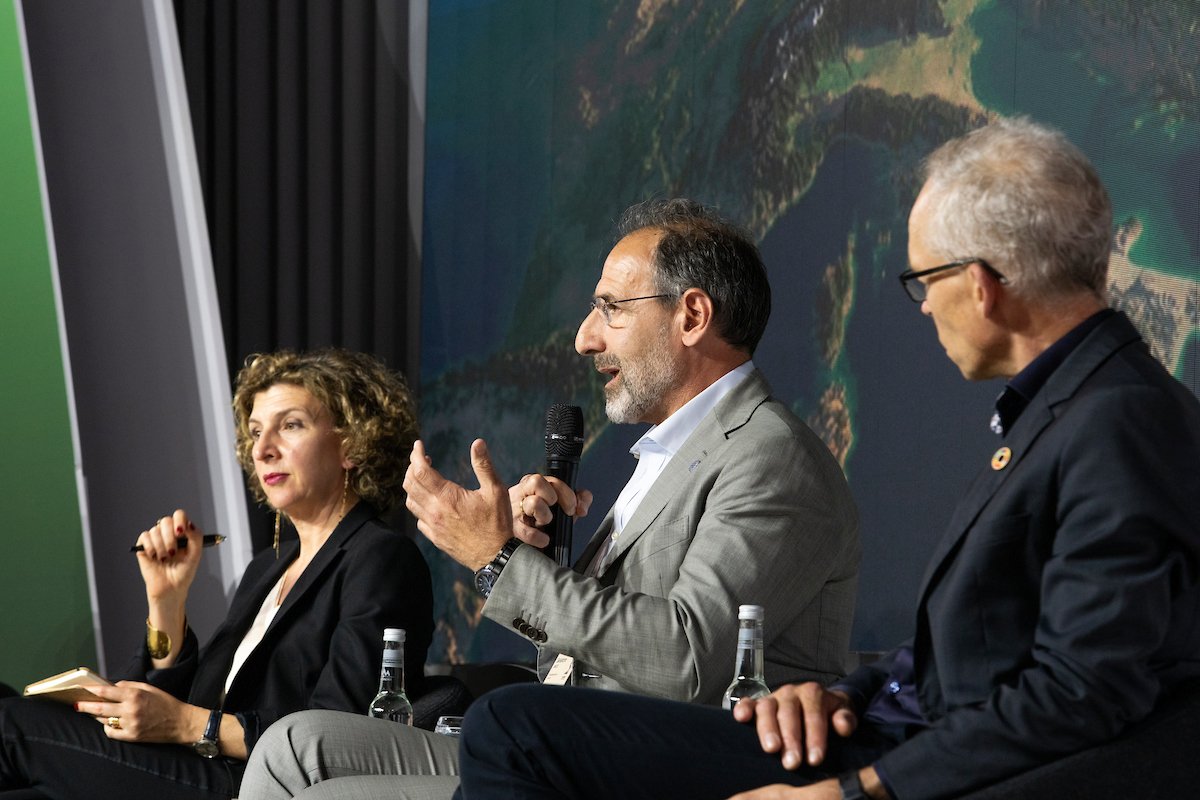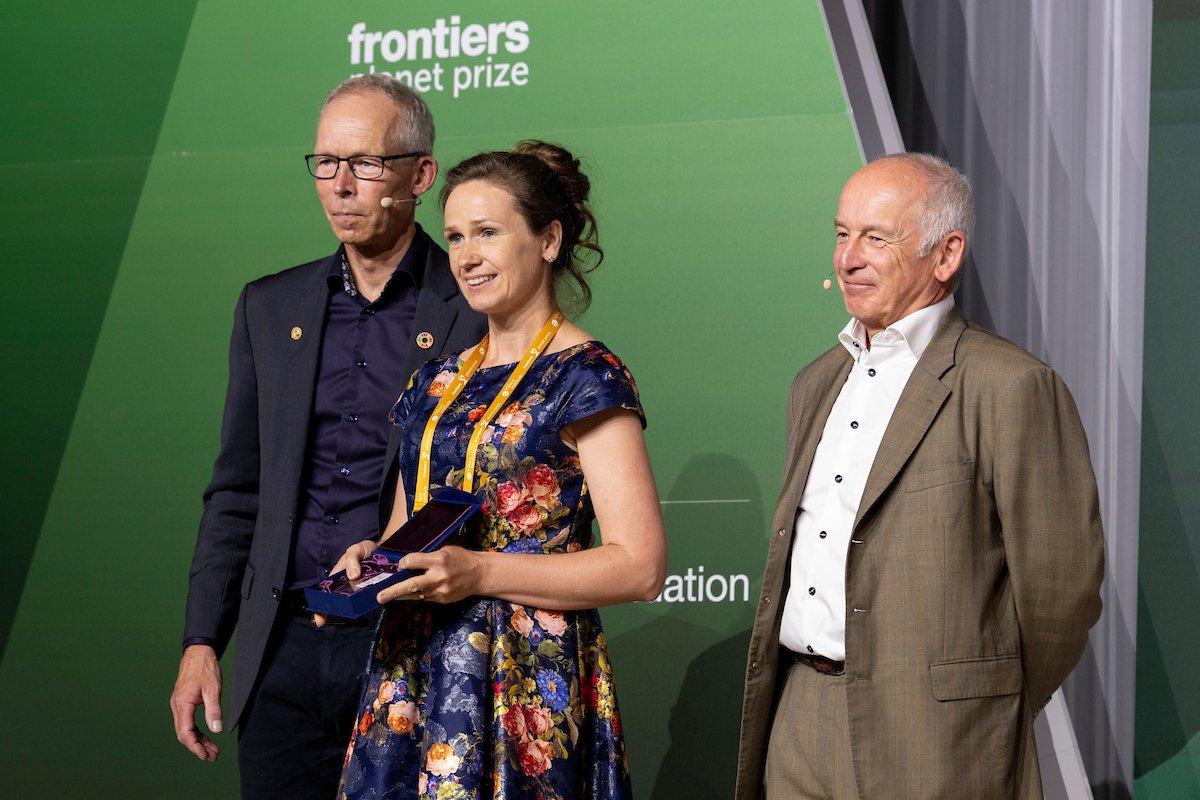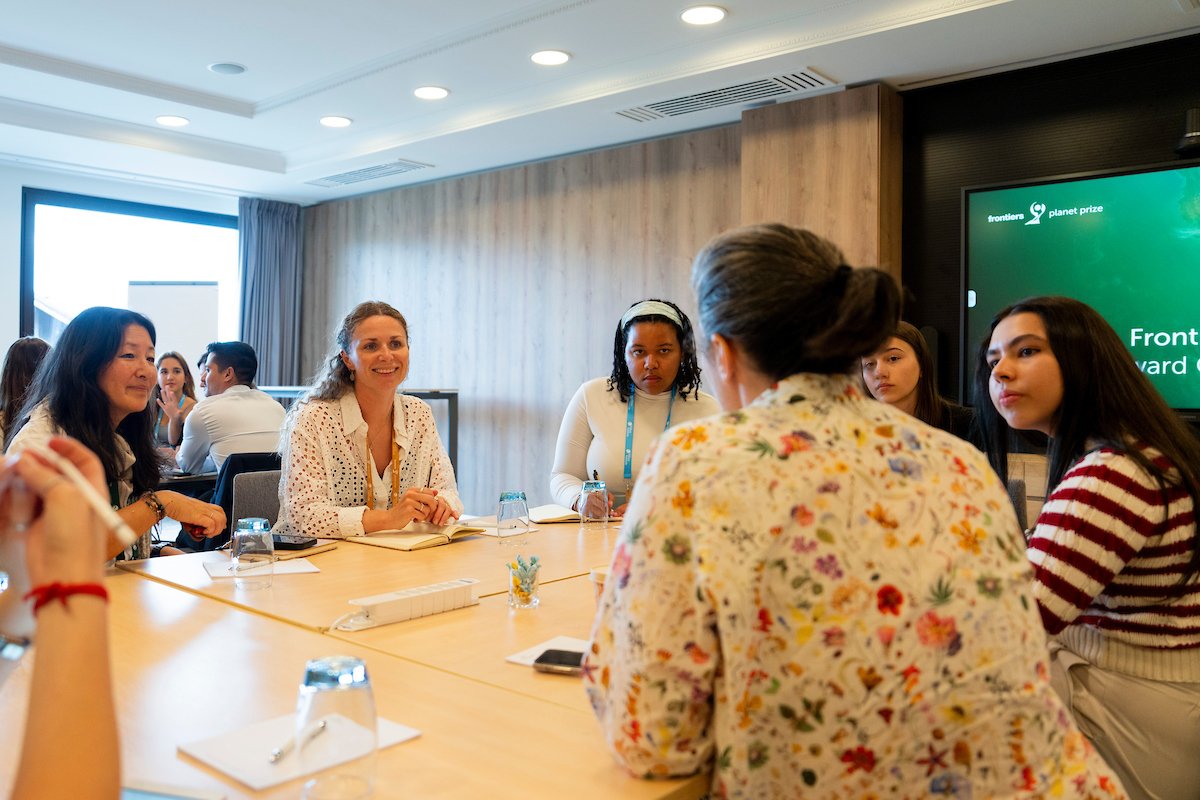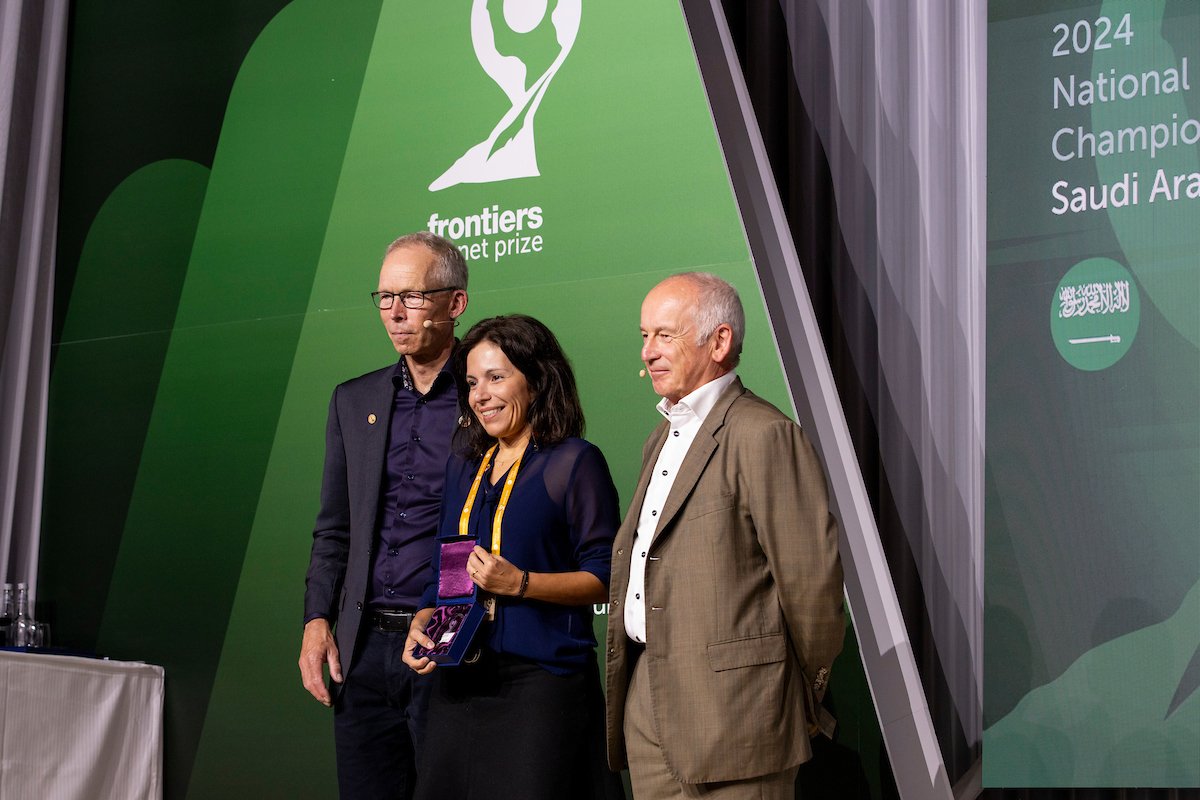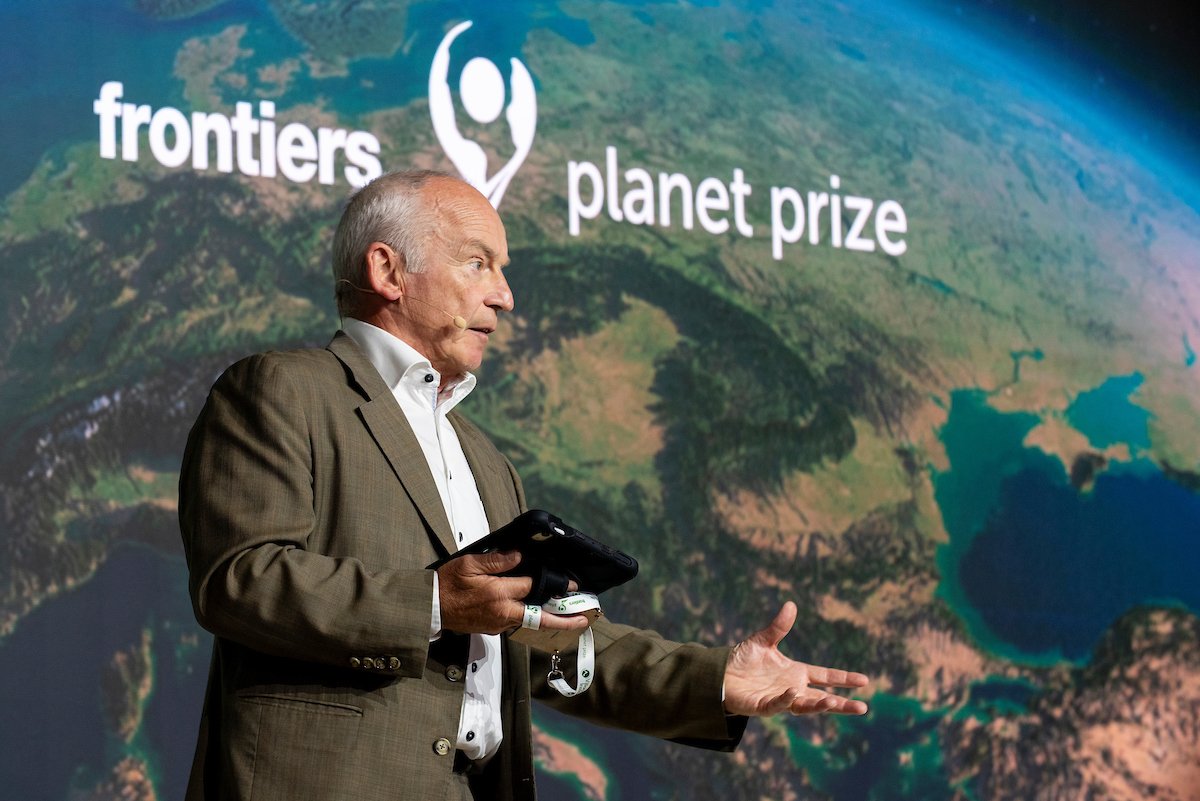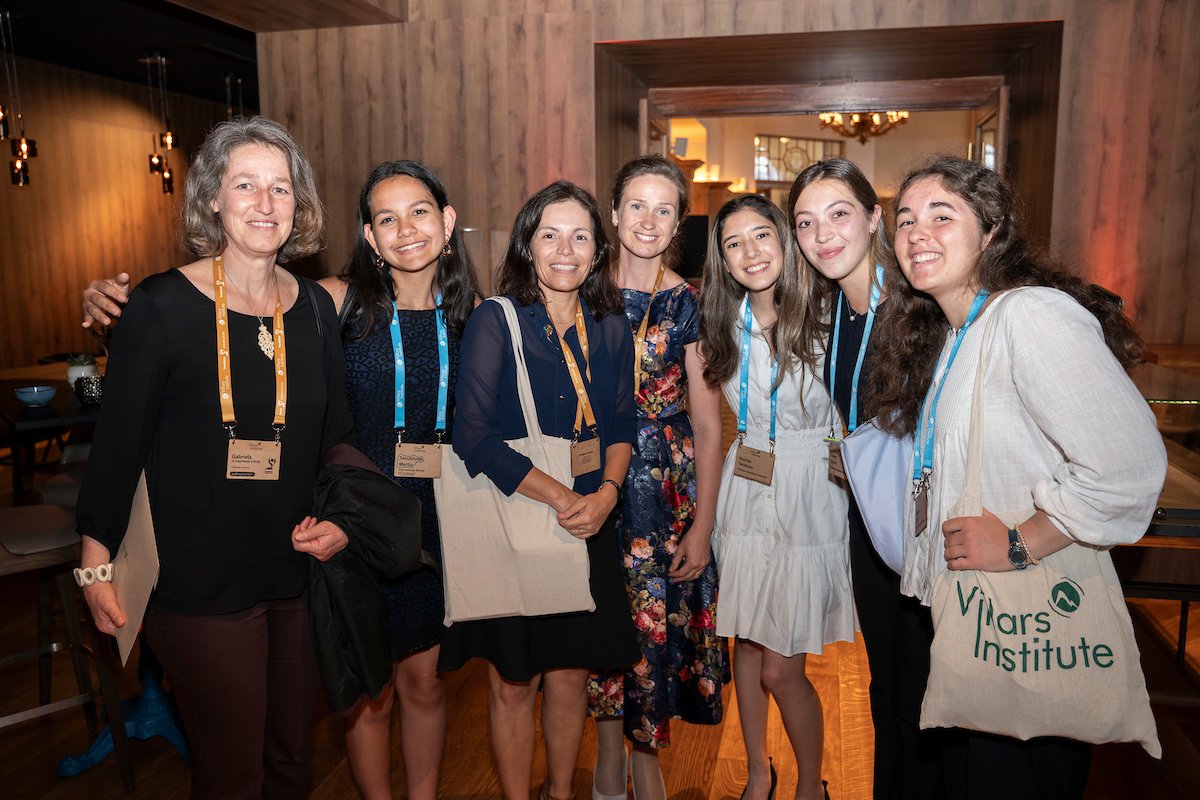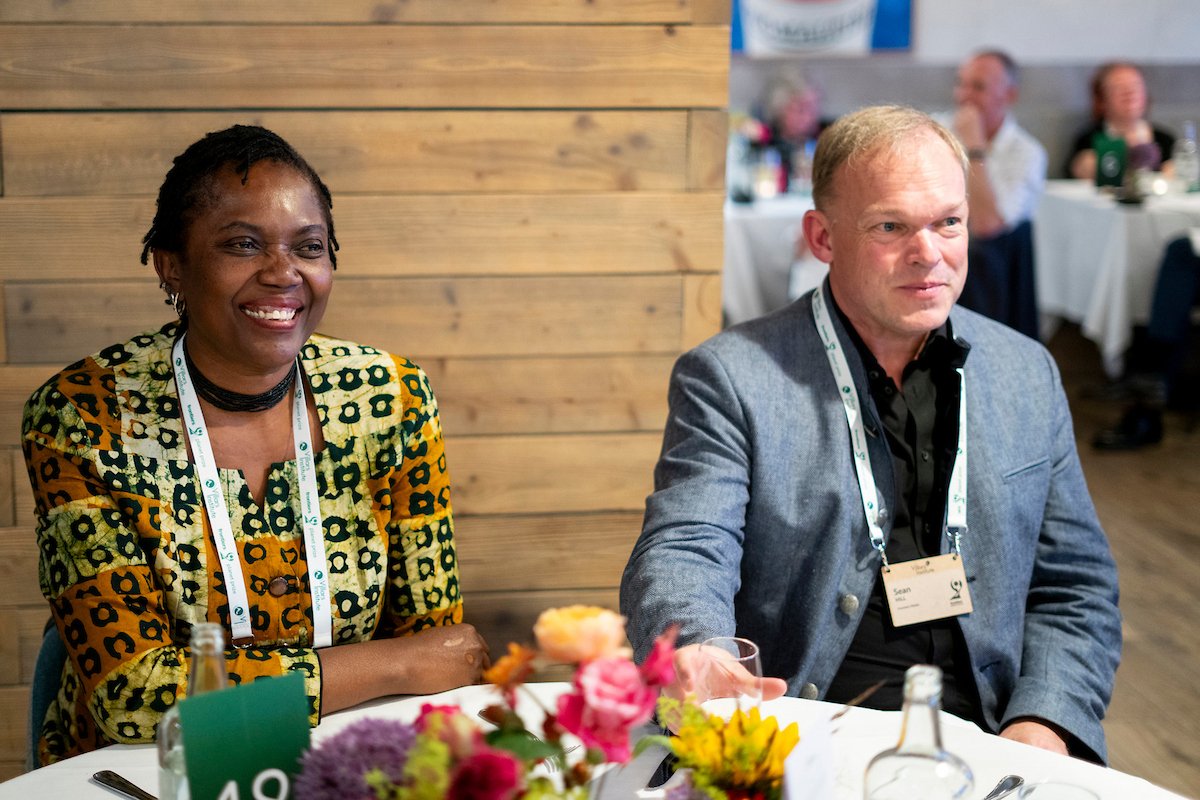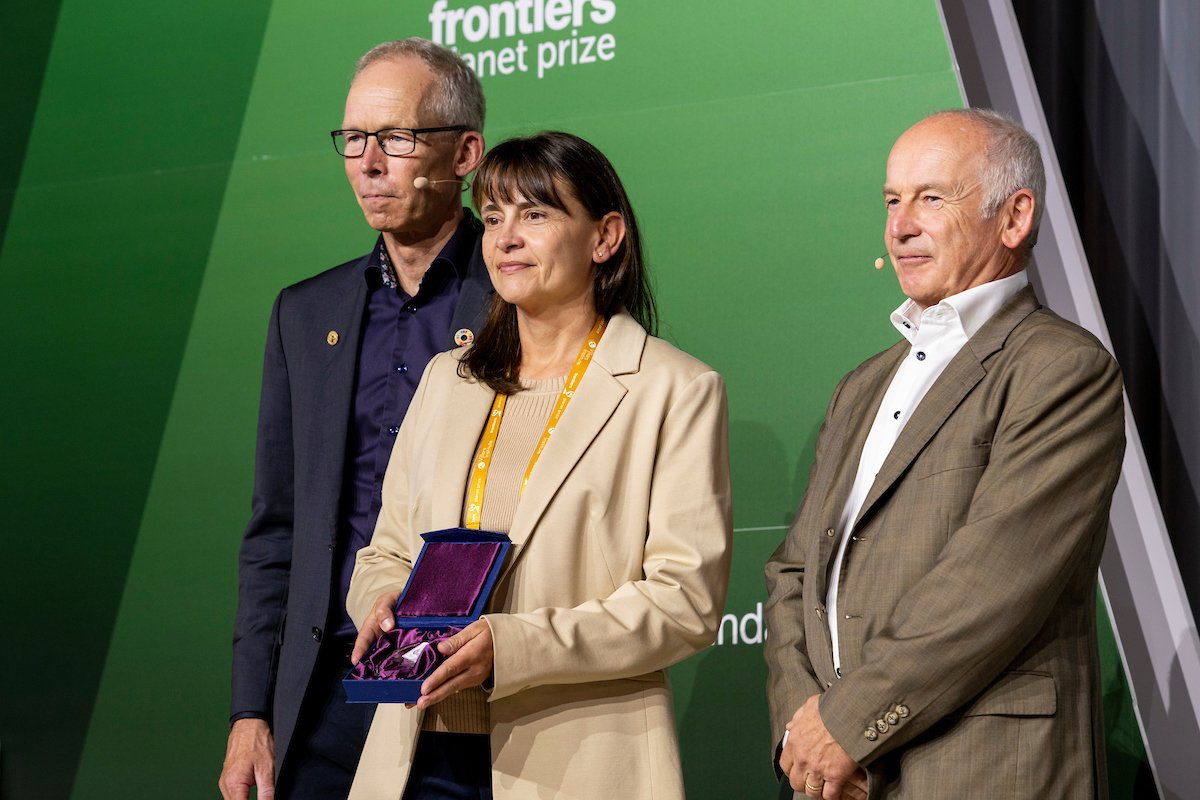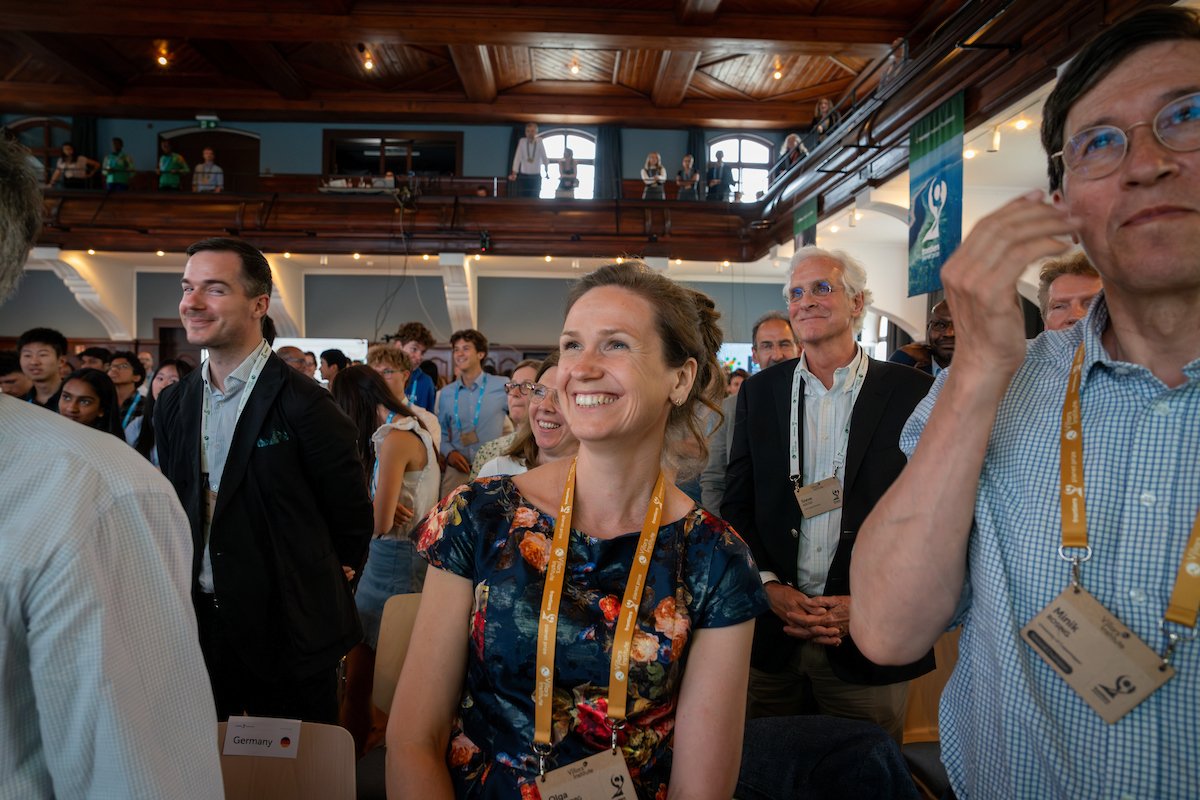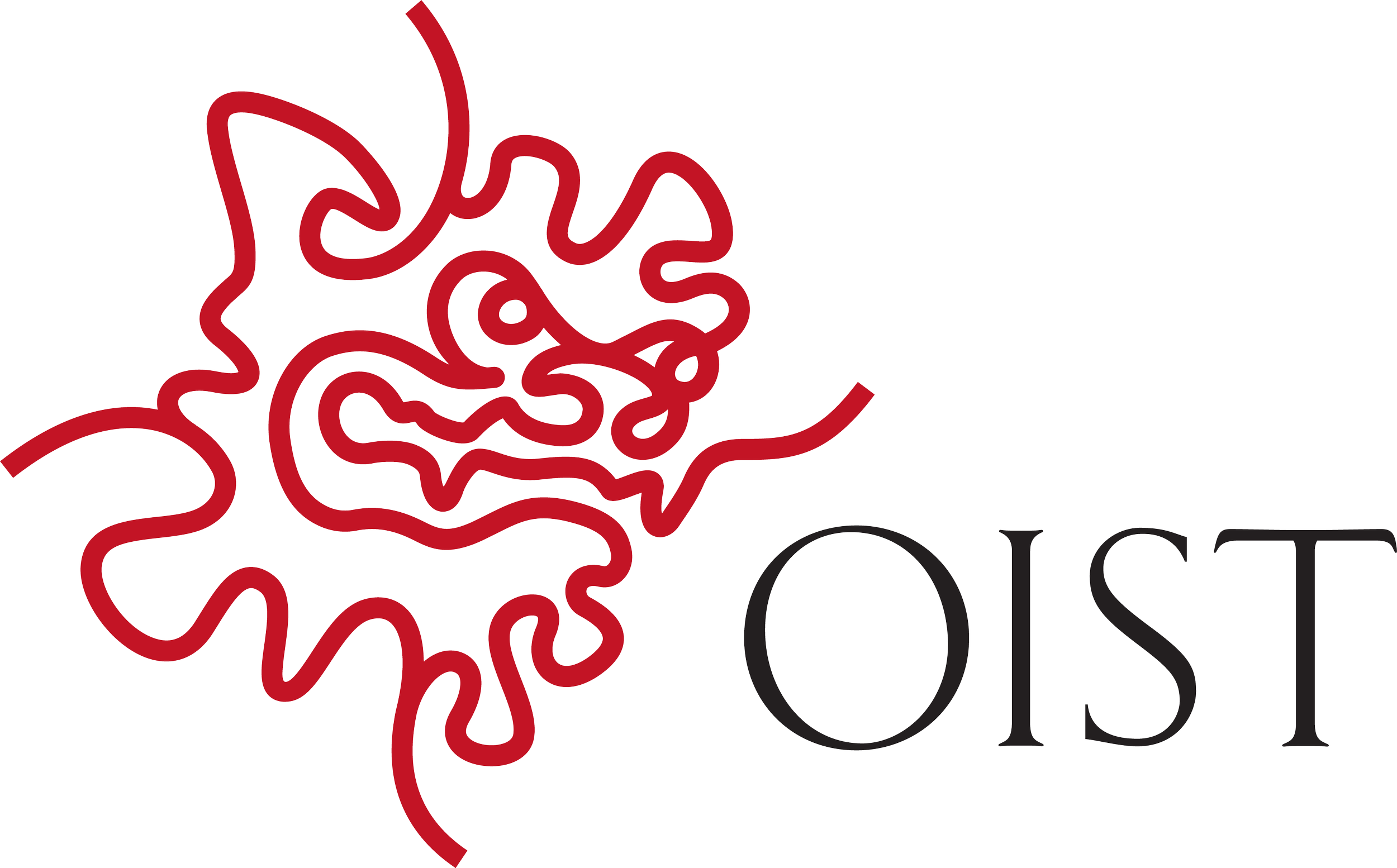The Champions of the second edition

Second edition
The International Champions of the second edition of the Frontiers Planet Prize were announced on June 26th, during the Awards Ceremony, in Villars-sur-Ollon, as part of the Villars Symposium.
Learn more about the second edition of the prize with our progress report:

Meet the 2nd edition International Champions
Argentina
Instituto Multidisciplinario de Biología Vegetal (CONICET-UNC)
Dr Pedro Jaureguiberry
The direct drivers of recent global anthropogenic biodiversity loss.
-
Biography:
I’m Pedro Jaureguiberry, based at the Instituto Multidisciplinario de Biología Vegetal in Córdoba, Argentina. While my primary research focus is fire ecology, I have also participated in large-scale interdisciplinary projects including the IPBES Global Assessment Report. Alongside a brilliant team of colleagues there, we conducted a global synthesis on the hierarchy of direct drivers of biodiversity loss, advancing the scope and rigor of previous knowledge. The culmination of our work was the publication of a high-impact paper, which we are presenting at the Frontiers Planet Prize 2024. Our study brings novel content and methodology insights, opening avenues for ongoing and future collaborations for generating much-needed knowledge to address the current global environmental crisis.
Planetary Boundaries Addressed:
Biosphere integrity, Climate change, Ocean acidification, Freshwater use, Land system change
Published in Science Advances. Contributing authors: Nicolas Titeux, Martin Wiemers, Diana E. Bowler, Luca Coscieme, Abigail S. Golden, Carlos A. Guerra, Ute Jacob, Yasuo Takahashi, Josef Settele, Sandra Díaz, Zsolt Molnár, Andy Purvis
Germany
Senckenberg Society for Nature Research
Prof Dr Peter Haase
The recovery of European freshwater biodiversity has come to a halt
-
Biography:
I’m Peter Haase, from Germany, based at the Senckenberg Society for Nature Research and the University of Duisburg-Essen. Our work identifies how, where, and why biodiversity is changing over time. Our nominated research finds that freshwater biodiversity across Europe has recovered over the past 50 years in response to targeted measures. Unfortunately, new stressors including climate change and emerging pollutants have stalled this recovery. Freshwater ecosystems remain below the threshold for good ecological quality targeted by the EU. Our results demonstrate both sides of the coin—negative ramifications for freshwater biodiversity when planetary boundaries are exceeded—but also an encouraging example of how appropriate action can ameliorate degraded ecosystems.Planetary Boundaries Addressed:
Biosphere integrity, Novel entities, Climate change, Freshwater use, Land system changePublished in Nature
Contributing authors: , Ellen A. R. Welti: Contributed significantly: Diana E. Bowler, Nathan J. Baker, Nuria Bonada, Sami Domisch, Jaime R. Garcia Marquez, Jani Heino, Daniel Hering, Sonja C. Jähnig, Astrid Schmidt-Kloiber, Rachel Stubbington, Additional 83 co-authors
United States
University of Notre Dame
Prof Jason Rohr
A planetary health innovation for disease, food, and water challenges in Africa
-
Biography:
I’m Jason Rohr, faculty at the University of Notre Dame and Director of Disease, Food, Energy, and Water Solutions, an interdisciplinary team from the USA, Senegal, Kenya, and France that works to uncover planetary health solutions for societies. Actions that Mobilize science for a global green renaissance are sustainably beneficial for the health of humans and ecosystems. Our nominated research offers an extremely rare example of a profitable and scalable win-win solution for environmental sustainability; food, energy and water access; poverty alleviation; and infectious disease control in marginalized communities in Africa. My team and I study the effects of environmental change on human and ecosystem health and embrace the interconnectedness of the many co-dependent grand challenges facing humanity.
Planetary Boundaries Addressed:
Biosphere integrity, Freshwater use, Land system change, Biogeochemical flowsPublished in Nature
Contributing authors: Alexandra Sack, Sidy Bakhoum, Christopher B. Barrett, David Lopez-Carr, Andrew J. Chamberlin, David J. Civitello, Cledor Diatta, Molly J. Doruska, Giulio A. De Leo, Christopher J. E. Haggerty, Isabel J. Jones, Nicolas Jouanard, Andrea J. Lund, Amadou T. Ly, Raphael A. Ndione, Justin V. Remais, Gilles Riveau, Anne-Marie Schacht, Momy Seck, Simon Senghor, Susanne H. Sokolow & Caitlin Wolfe

Meet the 2nd edition National Champions
Argentina
Instituto Multidisciplinario de Biología Vegetal (CONICET-UNC)
Dr Pedro Jaureguiberry
The direct drivers of recent global anthropogenic biodiversity loss.
-
Biography:
I’m Pedro Jaureguiberry, based at the Instituto Multidisciplinario de Biología Vegetal in Córdoba, Argentina. While my primary research focus is fire ecology, I have also participated in large-scale interdisciplinary projects including the IPBES Global Assessment Report. Alongside a brilliant team of colleagues there, we conducted a global synthesis on the hierarchy of direct drivers of biodiversity loss, advancing the scope and rigor of previous knowledge. The culmination of our work was the publication of a high-impact paper, which we are presenting at the Frontiers Planet Prize 2024. Our study brings novel content and methodology insights, opening avenues for ongoing and future collaborations for generating much-needed knowledge to address the current global environmental crisis.
Planetary Boundaries Addressed:
Biosphere integrity, Climate change, Ocean acidification, Freshwater use, Land system change
Published in Science Advances. Contributing authors: Nicolas Titeux, Martin Wiemers, Diana E. Bowler, Luca Coscieme, Abigail S. Golden, Carlos A. Guerra, Ute Jacob, Yasuo Takahashi, Josef Settele, Sandra Díaz, Zsolt Molnár, Andy Purvis
Australia
The University of Sydney
Dr Federico Maggi
Agricultural pesticide land budget and river discharge to oceans.
-
Biography:
I’m Federico Maggi, based at the University of Sydney, School of Civil Engineering, I investigate how contaminations affect the environment via both experimental observations and computer-aided risk analyses. Though my expertise in environmental engineering focusses on hydraulics and hydrology, I drifted my research interest towards contaminations as a result of my appreciation of the increasing pressure that our natural environments, including soil, water, and the wider ecosystems experience from anthropogenic actions. Specifically in the nominated work, my colleagues and I explored with the use of advanced mathematical models how complex a journey agricultural pesticides undertake through traversing soil and river systems of the world and in doing so, affecting the quality of aquifers and river waters all the way to our oceans.Planetary Boundaries Addressed:
Novel entities, Biogeochemical flows
Published in Nature.
Contributing authors: Fiona H.M. Tang, Francesco N. Tubiello
Austria
International Institute for Applied Systems Analysis
Dr Marta Kozicka
Feeding climate and biodiversity goals with novel plant-based meat and milk alternatives
-
Biography:
I’m Marta Kozicka from Poland. I am based at the International Institute for Applied Systems Analysis (IIASA) in Austria. At the Integrated Biosphere Futures Research Group we rely on the integrated modelling of natural resources and ecosystems management for the development of transformations in food and bio-based sectors that enable satisfying human needs while ensuring the sustainable use of terrestrial and marine environments. Our nominated research investigates the potential of novel food-based dietary transition to meet several sustainability objectives, including climate change mitigation and biodiversity loss reduction. My interests lie in multidimensional sustainability aspects of human diets that encompass food and nutrition security, as well as climate and environmental impacts.
Planetary Boundaries Addressed:
Biosphere integrity, Climate change, Freshwater use, Land system change, Biogeochemical flows
Published in Nature Communications.
Contributing authors: Pekka Lauri, Rebekah Moses, Esther Boere, Stefan Frank, Chris Davis, Esther Park, Noel Gurwick
Brazil
University of São Paulo
Prof Alexander Turra
Advancing plastic pollution hotspotting at the subnational level: Brazil as a case study in the Global South
-
Biography:
I’m Alexander Turra, a Brazilian biologist who was flooded by the ocean from a very young age. Building on my experience in marine ecology and coastal management, I had the opportunity to build up transdisciplinary skills that allowed me to dialogue with the most diverse social actors related to the ocean. Integration between ocean and society and between science and decision-making became my daily practice and represents one of the main goals of the UNESCO Chair for Ocean Sustainability, which I coordinate at the University of São Paulo. Marine litter is one of the challenges the chair addresses based on the contribution of an interdisciplinary team, as the study in which we proposed an alternative approach for hot-spotting marine litter land-based sources in the Global South context.
Planetary Boundaries Addressed:
Biosphere integrity, Climate change, Freshwater use, Land system change, Novel entities
Published in Marine Pollution Bulletin
Contributing authors: Melanie V. Alencar, Bianca G. Gimenez , Camila Sasahara, Carla I. Elliff, Costas A. Velis, Letícia S. Rodrigues, Luis A. Conti, Sylmara L. F. Gonçalves-Dias, Tiago B. Cetrulo, Vitória M. Scrich
Canada
Toronto Metropolitan University
Dr Umberto Berardi
Health-informed predictive regression for statistical-simulation decision-making in urban heat mitigation
-
Biography:
I’m Umberto Berardi, the Canada Research Chair in Building Science, Full Professor and Director of the BeTOP center at Toronto Metropolitan University in Toronto. My main research interests are related to the study of innovative solutions and new materials for improving the performance within the built environment. I work on integrating nanotechnologies into building systems focus on organic bio-PCMs, and on granular aerogels. My awards include the 2023 European Thermophysical Properties ECTP-NETZSCH AWARD; Early Research Career Excellence Award, 2018; and the Best Italian Engineer in North America award by the ISSNAF in Washington in October 2016. I have a body of funded research comprising over $2.5M in government and private sector sponsored research in the last five years.
Planetary Boundaries Addressed:
Climate change, Land system change
Published in Sustainable Cities and Society
Contributing authors: Mohamed Dardir, Jeffrey Wilson
-
Biography:
I'm Yang Ou, an assistant professor at Peking University. Our multi-team research, featured in the journal Science, evaluates new global commitments to curb greenhouse gas emissions in alignment with the objectives of the Paris Agreement. This analysis found that updated climate pledges, including net-zero commitments, could be further increased with greater ambition and the implementation of more robust policies and measures beyond 2030. This would lead to a marked improvement in the probability of keeping global warming under 2 degrees Celsius within this century. This project combines policy analysis with advanced energy, emissions, and climate modeling techniques, underscoring the significance of collaborative efforts in tackling global climate challenges.
Planetary Boundaries Addressed:
Climate change
Published in Science
Contributing authors: Gokul Iyer, Leon Clarke, Jae Edmonds, Allen A. Fawcett, Nathan Hultman, James R. McFarland, Matthew Binsted, Ryna Cui, Claire Fyson, Andreas Geiges, Sofia Gonzales-Zuñiga, Matthew J. Gidden, Niklas Höhne, Louise Jeffery, Takeshi Kuramochi, Jared Lewis, Malte Meinshausen, Zebedee Nicholls, Pralit Patel, Shaun Ragnauth, Joeri Rogelj, Stephanie Waldhoff, Sha Yu, Haewon McJeon
Denmark
University of Copenhagen
Prof Minik Rosing
Quantification of CO2 uptake by enhanced weathering of silicate minerals applied to acidic soils
-
Biography:
I’m Minik Rosing, born in Greenland and professor of Geology at University of Copenhagen, Denmark. My research is focused on the role of life in the planetary evolution of Earth and has helped showing that biology has regulated and stabilized Earth’s climate through 3700 million years. We now focus on how humanity can change its impact on Earth ecosystems and climate to provide a better future for all things living. For this to take place we need to instigate hope and base it on clear, simple, and scalable interventions available now. Naturally occurring rock flour produced by a billion tons every year by the Greenland Ice Sheet offers one such intervention that can dramatically increase global crop yield and reduce CO2 in the atmosphere through application in agriculture globally.Planetary Boundaries Addressed:
Biosphere integrity, Climate change, Ocean acidification, Land system change, Biogeochemical flowsPublished in International Journal of Greenhouse Gas Control Volume
Contributing authors: Christiana Dietzen
Finland
University of Helsinki
Dr Olga Tammeorg
Sustainable lake restoration: From challenges to solutions
-
Biography:
I’m Olga Tammeorg from the University of Helsinki in Finland. My work is motivated by the urgent need to respond to the impacts of nutrient pollution in lakes to address the societal crises of water quality decline and biodiversity loss. I called upon globally-recognized lake restoration experts and we shaped a new paradigm in the field: to conduct restoration activities delivering multiple environmental and socio-economic benefits beyond the intervention scale. This framework embeds lake restoration for food resilience, adapting to climate change and population growth, navigating fragile geopolitical situations, and dealing with the legacy pollution. We set a shared objective on the need to foster a more effective, inclusive, cost-efficient, environmentally friendly approach to lake restoration following circular economy thinking.
Planetary Boundaries Addressed:
Stratospheric ozone depletion, Biosphere integrity, Novel entities, Climate change, Ocean acidification, Freshwater use, Land system change, Biogeochemical flows, Atmospheric aerosol loadingPublished in WIREs Water
Contributing authors: Ingrid Chorus, Bryan Spears, Peeter Nõges, Gertrud K. Nürnberg, Priit Tammeorg, Martin Søndergaard, Erik Jeppesen, Hans Paerl, Brian Huser, Jukka Horppila, Tom Jilbert, Agnieszka Budzyńska, Renata Dondajewska-Pielka, Ryszard Gołdyn, Sina Haasler, Seppo Hellsten, Laura H. Härkönen, Mina Kiani, Anna Kozak, Niina Kotamäki, Katarzyna Kowalczewska-Madura, Silvia Newell, Leena Nurminen, Tiina Nõges, Kasper Reitzel, Joanna Rosińska, Jukka Ruuhijärvi, Soila Silvonen, Christian Skov, Tamara Važić, Anne-Mari Ventelä, Guido Waajen, Miquel Lürling
Germany
Senckenberg Society for Nature Research
Prof Dr Peter Haase
The recovery of European freshwater biodiversity has come to a halt
-
Biography:
I’m Peter Haase, from Germany, based at the Senckenberg Society for Nature Research and the University of Duisburg-Essen. Our work identifies how, where, and why biodiversity is changing over time. Our nominated research finds that freshwater biodiversity across Europe has recovered over the past 50 years in response to targeted measures. Unfortunately, new stressors including climate change and emerging pollutants have stalled this recovery. Freshwater ecosystems remain below the threshold for good ecological quality targeted by the EU. Our results demonstrate both sides of the coin—negative ramifications for freshwater biodiversity when planetary boundaries are exceeded—but also an encouraging example of how appropriate action can ameliorate degraded ecosystems.Planetary Boundaries Addressed:
Biosphere integrity, Novel entities, Climate change, Freshwater use, Land system changePublished in Nature
Contributing authors: , Ellen A. R. Welti: Contributed significantly: Diana E. Bowler, Nathan J. Baker, Nuria Bonada, Sami Domisch, Jaime R. Garcia Marquez, Jani Heino, Daniel Hering, Sonja C. Jähnig, Astrid Schmidt-Kloiber, Rachel Stubbington, Additional 83 co-authors
Hungary
HUN-REN Centre for Economic and Regional Studies
Dr Daniel Muth
Pathways to stringent carbon pricing: Configurations of political economy conditions and revenue recycling strategies. A comparison of thirty national level policies
-
Biography:
I’m Daniel Muth from Hungary. I work as a junior research fellow at the Institute of World Economics in Budapest. I am currently finishing my PhD in Public Policy at Central European University, Vienna. Throughout my studies and career, my mind has riveted towards finding solutions to two interconnected problems: protecting our environment and improving socioeconomic conditions across the globe. My paper examines how specific design elements of carbon pricing policies might help enhance their political acceptability, which is a crucial condition for adopting environmentally effective measures. In my work, I analyze domestic and global climate policy development, through the lens of political economy, to formulate an interdisciplinary assessment of specific sustainability issues.
Planetary Boundaries Addressed:
Climate changePublished in Ecological Economics
Italy
University of Bologna
Dr Francesco Sabatini
Global patterns of vascular plant alpha diversity
-
Biography:
I’m Francesco Maria Sabatini, a forest ecologist and macroecologist specialized in plants and vegetation at Alma Mater Studiorum - University of Bologna, Italy. I led this research as I was coordinator of sPlot, the global vegetation plot database, at the German Center for Integrative Biodiversity Research (iDiv). sPlot is a collaborative initiative to integrate existing local and national vegetation-plot datasets into a global harmonized database. It is a consortium of 262 scientists (and counting), from 190 institutions and 58 countries. sPlot's overarching scientific goal is the exploration of all aspects of global plant community diversity, including taxonomic, functional and phylogenetic diversity, across biomes, vegetation types, taxonomic or functional guilds and scales.Planetary Boundaries Addressed:
Biosphere integrity, Climate change, Land system change
Published in Nature Communications
Contributing authors: Borja Jiménez-Alfaro, Ute Jandt, Milan Chytrý, Richard Field, Michael Kessler, Jonathan Lenoir, Franziska Schrodt, Susan K. Wiser, Mohammed A.S. Arfin Khan, Fabio Attorre, Luis Cayuela, Michele De Sanctis, Jürgen Dengler, Sylvia Haider, Mohamed Z. Hatim, Adrian Indreica, Florian Jansen, Aníbal Pauchard, Robert K. Peet, Petr Petrík, Valério D. Pillar, Brody Sandel, Marco Schmidt, Zhiyao Tang, Peter van Bodegom, Kiril Vassilev, Cyrille Violle, Esteban Alvarez-Davila, Priya Davidar, Jiri Dolezal, Bruno Hérault, Antonio Galán-de-Mera, Jorge Jiménez, Stephan Kambach, Sebastian Kepfer-Rojas, Holger Kreft, Felipe Lezama, Reynaldo Linares-Palomino, Abel Monteagudo Mendoza, Justin K N'Dja, Oliver L. Phillips, Gonzalo Rivas-Torres, Petr Sklenár, Karina Speziale, Ben J. Strohbach, Rodolfo Vásquez Martínez, Hua-Feng Wang, Karsten Wesche, Helge Bruelheide
Japan
Okinawa Institute of Science and Technology
Prof Evan Economo
The global distribution of known and undiscovered ant diversity
-
Biography:
Im Evan Economo, based at the Okinawa Institute of Science and Technology, where I lead the Biodiversity and Biocomplexity Unit. My research group utilizes emerging technologies such as machine learning (ML), genomic sequencing, and 3D imaging to document, understand, and conserve invertebrates. The nominated research reflects a decade of work by a global collaboration and the fruits of 300 years of work by naturalists and collectors around the world to discover, document, and organize information on ant species. By digitizing and synthesizing hundreds of years of obscure observations into a synthetic picture, it provides a bridge between Victorian-era naturalists and the modern era of big data and ML-driven science. This allows us to integrate the often-overlooked ant species into global conservation planning and ultimately better protect organisms that are essential for biosphere integrity and the ecosystems that support humanity.Planetary Boundaries Addressed:
Biosphere integrity
Published in Science Advances
Contributing authors: "Jamie M. Kass, Benoit Guénard, Kenneth L. Dudley, Clinton N. Jenkins, Fumika Azuma, Brian L. Fisher, Catherine L. Parr, Heloise Gibb, John T. Longino, Philip S. Ward, Anne Chao, David Lubertazzi, Michael Weiser, Walter Jetz, Robert Guralnick, Rumsaïs Blatrix, James Des Lauriers, David A. Donoso, Christos Georgiadis, Kiko Gomez, Peter G. Hawkes, Robert A. Johnson, John E. Lattke, Joe A. MacGown, William Mackay, Simon Robson, Nathan J. Sanders, Robert R. Dunn,"
New Zealand
The University of Auckland
Dr Rebecca Gladstone-Gallagher
Social–ecological connections across land, water, and sea demand a reprioritization of environmental management
-
Biography:
I’m Rebecca Gladstone-Gallagher from the University of Auckland, New Zealand. I’m an emerging ecologist investigating degradation, recovery, and restoration in coastal marine ecosystems. These are social-ecological issues, and the nominated research grew out of the collective efforts of 17 researchers spanning ecology, economy, ecosystem modelling, indigenous knowledge systems and social science. Our critical advance was to link ways environmental managers can act on connections across systems. This is an emerging trend in my research that recognises the importance of networks in driving human-nature connections and shifting focus from stressors to ecosystem responses to foster actions where data and resources are limited.Planetary Boundaries Addressed:
Biosphere integrity, Climate change, Ocean acidification, Freshwater use, Land system change, Biogeochemical flows
Published in Elementa: Science of the AnthropoceneContributing authors: Jason M. Tylianakis, Johanna Yletyinen, Vasilis Dakos, Emily J. Douglas, Suzie Greenhalgh, Judi E. Hewitt, Daniel Hikuroa, Steven J. Lade, Richard Le Heron, Alf Norkko, George L. W. Perry, Conrad A. Pilditch, David Schiel, Ewa Siwicka, Helen Warburton, Simon F. Thrush
Poland
Adam Mickiewicz University Poznań
Dr Michal Bogdziewicz
Reproductive collapse in European beech results from declining pollination efficiency in large trees
-
Biography:
I'm Michał Bogdziewicz, affiliated with Adam Mickiewicz University in Poznań, Poland. The group that coauthored the nominated research formed in 2020, and explores the impact of climate change on forest reproduction. Trees exhibit significant variation in seed production annually, a phenomenon known as masting, which synchronizes among trees. Masting regulates seed consumer populations and enhances pollination efficiency. Our findings reveal that climate warming disrupts masting, leading to increased seed predation and reduced pollination efficiency, resulting in an 80% decline in fecundity. This discovery suggests potential regeneration challenges for forests. We now seek to uncover mechanisms of ""masting breakdown"" and propose solutions to sustainably manage forests in the 21st century.
Planetary Boundaries Addressed:
Climate change, Land system change
Published in Global Change Biology
Contributing authors: Dave Kelly, Andrew J. Tanentzap, Peter Thomas, Jessie Foest, Jonathan Lageard, Andrew Hacket-Pain
Saudi Arabia
King Abdullah University of Science and Technology
Prof Raquel Peixoto
Harnessing the microbiome to prevent global biodiversity loss
-
Biography:
I’m Raquel Peixoto, based at King Abdullah University of Science and Technology. Growing up in Brazil, I experienced first-hand the increasing threats to biodiversity while several planetary boundaries were breached by human activity. I therefore decided to use a polyphasic approach to develop natural medicines having the potential to support One Health, together with my co-authors, collaborators and group. My research proved the concept that the use of coral probiotics can increase the host’s resilience and resistance against environmental threats and even evade mortality. This pioneering work has paved the way for new approaches to reveal and explore mechanisms of symbiotic interactions, creating an entire new field of research that has now been also developed by many scientists worldwide.
Planetary Boundaries Addressed:
Biosphere integrity, Climate change, Ocean acidification, Biogeochemical flows
Published in Nature Microbiology
Contributing authors: Peixoto, Christian R. Voolstra, Michael Sweet, Carlos M. Duarte, Susana Carvalho, Helena Villela, Jeantine E. Lunshof, Lone Gram, Douglas C. Woodhams, Jens Walter, Anna Roik, Ute Hentschel, Rebecca Vega Thurber, Brendan Daisley, Blake Ushijima, Daniele Daffonchio, Rodrigo Costa, Tina Keller-Costa, Jeff S. Bowman, Alexandre S. Rosado, Gregor Reid, Christopher E. Mason, Jenifer B. Walke, Torsten Thomas, Gabriele Berg
South Africa
Nelson Mandela University
Dr Mia Strand
Reimagining Ocean Stewardship: Arts-Based Methods to ‘Hear’ and ‘See’ Indigenous and Local Knowledge in Ocean Management
-
Biography:
"I’m Mia Strand, originally from Norway, but residing in South Africa which has been my home for the last eight years. I am currently based at Nelson Mandela University in Gqeberha. My co-authors, Nina Rivers and Bernadette Snow, are both from South Africa, and have additional affiliations in the UK. At the Institute for Coastal and Marine Research we explore how to advance social-ecological systems approaches to ocean decision-making such as marine spatial planning. Our nominated research formed part of my PhD research, which explored the value of arts-based participatory research for more inclusive and equitable ocean governance in South Africa, specifically emphasising the need to better recognise Indigenous and local knowledge systems in decision-making processes.Planetary Boundaries Addressed:
Biosphere integrity, Novel entities, Climate change, Land system change, Biogeochemical flowsPublished in Frontiers in Marine Science
Contributing authors: Nina Rivers, Bernadette Snow
South Korea
Pohang University of Science and Technology
Prof Seung-Ki Min
Observationally-constrained projections of an ice-free Arctic even under a low emission scenario
-
Biography:
I’m Seung-Ki Min, based at Pohang University of Science and Technology (POSTECH), South Korea. The assessment of climate change impacts and the evaluation and selection of adaptation strategies require climate information that is both regional in space and localized in time. My group (Climate Change Research Lab) is working on understanding and predicting regional-scale climate changes through the use of newly available observations, climate modelling and experiments, and development and application of improved statistical techniques. In particular, attributing past and future changes in high-impact climate extremes such as heavy precipitation, heat wave, drought, and Arctic sea-ice melting and identifying associated physical mechanisms are among major topics of our current research.Planetary Boundaries Addressed:
Biosphere integrity, Climate change, Freshwater use, Atmospheric aerosol loading
Published in Nature CommunicationsContributing authors: Yeon-Hee Kim, Nathan P. Gillett, Dirk Notz, Elizaveta Malinina
Spain
Universitat Politècnica de València
Dr Alexandra Velty
Advanced zeolite and ordered mesoporous silica-based catalysts for the conversion of CO2 to chemicals and fuels
-
Biography:
I’m Alexandra Velty, originally from France and based at the Technical University of Valencia in Spain. At the Institute of Chemical Technology, we focus on the molecular design of heterogeneous catalysts for the development of sustainable and efficient processes for chemicals and energy production. Our nominated work shows how the use of zeolites and ordered mesoporous materials can contribute to CO2 conversion to simultaneously mitigate CO2 emissions and produce sustainable chemicals and fuels, a challenging and promising alternative to meet global demand. In the quest for sustainability, my work focuses on the design, preparation and use of solid catalysts for the reengineering of industrial processes and the utilization of renewable sources to produce chemicals and energy.
Planetary Boundaries Addressed:
Atmospheric aerosol loadingPublished in Chemical Society Reviews
Contributing authors: Avelino Corma
Sweden
Umeå University
Dr Gerard Rocher-Ros
Global methane emissions from rivers and streams
-
Biography:
I’m Gerard Rocher-Ros, working at the Swedish University of Agricultural Sciences and Umeå University in Sweden. Together with my international collaborators we explore the role of rivers emitting methane to the atmosphere. Our nominated article provides the most comprehensive assessment of global river methane emissions, stressing the importance of rivers to constrain the global methane budget. Our research also points out that human-influenced rivers have high methane emissions, suggesting that river restoration can have positive climate benefits beyond the traditional focus on improving water quality. In my work I combine large-scale datasets, novel experiments and advanced models to better understand the global functioning of rivers as the arteries of Earth.
Planetary Boundaries Addressed:
Climate change, Freshwater use, Land system change, Biogeochemical flowsPublished in Nature
Contributing authors: Emily H. Stanley, Luke C. Loken, Nora J. Casson, Peter A. Raymond, Shaoda Liu, Giuseppe Amatulli, Ryan A. Sponseller
Switzerland
University of Zurich
Prof Dr Gabriela Schaepman-Strub
Vegetation type is an important predictor of the arctic summer land surface energy budget
-
Biography:
I’m Gabriela Schaepman-Strub, a professor of Earth System Science, University of Zurich. I represent the Arctic Surface Energy Budget Synthesis (Arctic-SEB) group, in collaboration with Dr. Jacqueline Oehri as leading postdoc and 72 international scientists. Through this synthesis study, we identified surface energy flux measurements, formed the Arctic-SEB group, and analysed drivers of fluxes. Running flux towers in the Arctic is extremely challenging, resulting in a very low density of long-term flux measurements over Arctic terrestrial surfaces. Such observational networks however are critical to understand energy and carbon feedbacks between the atmosphere and land surface, under thawing permafrost, increasing tundra fires, and industrial development.Planetary Boundaries Addressed:
Biosphere integrity, Novel entities, Climate change, Land system change, Biogeochemical flowsPublished in Nature communications
Contributing authors: Jacqueline Oehri, Jin-Soo Kim, Raleigh Grysko, Heather Kropp, Inge Grünberg, Vitalii Zemlianskii, Oliver Sonnentag, Eugénie S. Euskirchen, Merin Reji Chacko, Giovanni Muscari, Peter D. Blanken, Joshua F. Dean, Alcide di Sarra, Richard J. Harding, Ireneusz Sobota, Lars Kutzbach, Elena Plekhanova, Aku Riihelä, Julia Boike, Nathaniel B. Miller, Jason Beringer, Efrén López-Blanco, Paul C. Stoy, Ryan C. Sullivan, Marek Kejna, Frans-Jan W. Parmentier, John A. Gamon, Mikhail Mastepanov, Christian Wille, Marcin Jackowicz-Korczynski, Dirk N. Karger, William L. Quinton, Jaakko Putkonen, Dirk van As, Torben R. Christensen, Maria Z. Hakuba, Robert S. Stone, Stefan Metzger, Baptiste Vandecrux, Gerald V. Frost, Martin Wild, Birger Hansen, Daniela Meloni, Florent Domine, Mariska te Beest, Torsten Sachs, Aram Kalhori, Adrian V. Rocha, Scott N. Williamson, Sara Morris, Adam L. Atchley, Richard Essery, Benjamin R. K. Runkle, David Holl, Laura D. Riihimaki, Hiroki Iwata, Edward A. G. Schuur, Christopher J. Cox, Andrey A. Grachev, Joseph P. McFadden, Robert S. Fausto, Mathias Göckede, Masahito Ueyama, Norbert Pirk, Gijs de Boer, M. Syndonia Bret-Harte, Matti Leppäranta, Konrad Steffen, Thomas Friborg, Atsumu Ohmura, Colin W. Edgar, Johan Olofsson, Scott D. Chambers
Turkey
Hacettepe University
Prof Dr Mustafa Sahmaran
The effects of various operational- and materials-oriented parameters on the carbonation performance of low-quality recycled concrete aggregate
-
Biography:
I’m Mustafa Şahmaran, a full professor in the Department of Civil Engineering at Hacettepe University. Specialties of my research group include the resource efficiency & circular economy of building products, recycling industrial & natural wastes into useful building materials, new generation multifunctional composites including additive manufacturing in construction, carbon capture, smart cities and low-cost & high-speed accommodation to vulnerable groups. I received the Province of Ontario Fellowship in 2007, Turkish Academy of Sciences Distinguished Young Scientist Award in 2012, The Scientific & Technological Research Council of Turkey’s Young Scientist Incentive Award in 2014, The American Concrete Institute Wason Medal in 2018, UNESCO Newton Country Prize in 2020.Planetary Boundaries Addressed:
Climate changePublished in European Geosciences Union Ocean Science
Contributing authors: Burak Dündar, Merve Sönmez Tugluca, Hüseyin Ilcan, Oguzhan Sahin
United Kingdom
Plymouth Marine Laboratory
Prof Stephen Widdicombe
Unifying biological field observations to detect and compare ocean acidification impacts across marine species and ecosystems: what to monitor and why
-
Biography:
I’m Steve Widdicombe from the Plymouth Marine Laboratory, based in the UK, and the Co-Chair of the Global Ocean Acidification Observing Network (GOA-ON) - a group of nearly 1000 researchers from over 100 countries studying the causes and consequences of ocean acidification (OA). We focus on the way OA effects marine organisms and in developing new methods to better observe and monitor those biological impacts. Our nominated research presents a novel way to directly compare observations of different biological responses in ways that allow us to get a truly global view of OA impacts. It Revealed, for the first time, the speed and severity of OA impacts on marine organisms and ecosystems in different places and situations, and for those geographic areas at greatest risk of ecosystem damage from OA to be identified.Planetary Boundaries Addressed:
Biosphere integrity, Climate change, Ocean acidification, Atmospheric aerosol loadingPublished in Journal of Building Engineering
Contributing authors: Kirsten Isensee, Yuri Artioli, Juan Diego Gaitán-Espitia, Claudine Hauri, Janet A. Newton, Sam Dupont, Mark Wells
United States
University of Notre Dame
Prof Jason Rohr
A planetary health innovation for disease, food, and water challenges in Africa
-
Biography:
I’m Jason Rohr, faculty at the University of Notre Dame and Director of Disease, Food, Energy, and Water Solutions, an interdisciplinary team from the USA, Senegal, Kenya, and France that works to uncover planetary health solutions for societies. Actions that Mobilize science for a global green renaissance are sustainably beneficial for the health of humans and ecosystems. Our nominated research offers an extremely rare example of a profitable and scalable win-win solution for environmental sustainability; food, energy and water access; poverty alleviation; and infectious disease control in marginalized communities in Africa. My team and I study the effects of environmental change on human and ecosystem health and embrace the interconnectedness of the many co-dependent grand challenges facing humanity.
Planetary Boundaries Addressed:
Biosphere integrity, Freshwater use, Land system change, Biogeochemical flowsPublished in Nature
Contributing authors: Alexandra Sack, Sidy Bakhoum, Christopher B. Barrett, David Lopez-Carr, Andrew J. Chamberlin, David J. Civitello, Cledor Diatta, Molly J. Doruska, Giulio A. De Leo, Christopher J. E. Haggerty, Isabel J. Jones, Nicolas Jouanard, Andrea J. Lund, Amadou T. Ly, Raphael A. Ndione, Justin V. Remais, Gilles Riveau, Anne-Marie Schacht, Momy Seck, Simon Senghor, Susanne H. Sokolow & Caitlin Wolfe

Photo highlights
